#no word doc we go straight to text post and write with no proof reading
Text
inspired by this post
it starts happening every so often: a cup of heavy cream before bed.
graeme had mentioned it helped better than milk for sleep. matty gave it a go and it worked! something about the thick, warm liquid settling in his tummy made matty’s eyes droop. each cup of the stuff made him sleep like a rock. so of course he starts asking for it more often, eventually begging graeme to add something sweeter to cream to improve the taste. a tall mug of rich and creamy hot chocolate soon becomes part of the routine. he’s learned if he can drink it fast enough he can feel the warm cream slosh around in his stomach while he settles into bed. it’s been a few weeks now and all it takes is three big gulps to finish it off.
one night after downing his nightly cocoa, matty asks,
“hey babe? do you think these pants are getting tighter?”
graeme looks down. the elastic band of matty’s plaid pajama bottoms digs into his waist, leaving a small muffin top and pair of love handles.
“why do you say that?” graeme asks as if he wasn’t the one with his hands all over that growing, cream-filled belly every night.
“i dunno…i just feel like this—” matty lightly jumps in place, gesturing toward the jiggly layer of fat around his waist. “—wasn’t here a month ago.”
a tinge of pink spreads across graemes cheeks. “nah.” he smirks. “they must have shrunk in the wash or something.”
#no word doc we go straight to text post and write with no proof reading#sunny writes#belly kink#belly#male weight gain#wg denial#wg story#feeding kink#liquid inflation#kinda I guess to bl#oc: matty#oc: graeme
77 notes
·
View notes
Text
LUDO (MARS, PETER, ARNOLD, DAMIEN, WHATEVER ELSE ALT YOU’VE WHIPPED UP LATELY), THE OWNER OF ONE OF US:
it’s been a long time coming, and you know why it’s all come down to this. you’ve manipulated enough people during your time on roleplayer.me that i’m sure you thought you’d get away with it forever. well, it doesn’t work that way. you get what you give, and you’ve given enough grief to last a lifetime.
you’ve put people who once called you friend through hell, and now you get a taste of it. and i want to make this point very clear: i do not care about your sob story. i do not care about how much you’ve been hurt. i do not care about how you got to where you are today. none of what you can say excuses the absolute hell you’ve put others through. take accountability. apologize. do what you can to right your wrongs. the pain you’ve caused is YOUR responsibility. you can’t put this on anyone but yourself. you can’t expect to hurt so many people and not be held accountable for it.
this case was rather personal to me because ludo likes to use his personality disorder as a crutch and an excuse to get away with his nasty abuse. i have the same disorder. by using your personality disorder as an excuse, ludo, you are glorifying it because you are making it your escape route. this disorder is NOT to be used as a crutch. no disorder is. you use it as a crutch as if you aren’t in crutches because of this debilitating disorder. you’re the reason our disorder is looked upon with suspicion instead of understanding. you cannot use your disorder as any type of “please forgive me” card unless you are actively trying to get better. and you aren’t. because you think therapy is a farce.
before i go into the evidence i wanted to ask for testimonies from those who were hurt. i was given this:
“There are a few things that should be said before you take your time reading all this. This is a place of roleplay and to escape. Unfortunately, some people use the hobby incorrectly. You ruin and sabotage the experience for others. A good amount of the users on this site may have a lot going on away from the screen, some don’t. Those who struggle are the victims of these narcissistic tendencies. Their emotions get involved without their control. They try to be there for someone despite their own issues. Sometimes they even try to put that other person first, which causes them to break. Then, there are some of us that cannot be emotionally manipulated and that is when these mind games go wrong. That is when the manipulator becomes so little and they try to blame other issues in life for their shit behaviour.
This place does not, and I repeat - it does not give anyone the permission to attack and belittle others because you have difficulty having a voice in your real life. It does not give you the right to attack someone's real life, because you said it yourself that you feel like you have not done anything great in yours. Your real life problems, your conditions, there are no excuse for those who have been degraded by you. There are a lot of them, by the way. Those people you still accuse of having abandoned you despite you being convinced that you were good to them? None of these people have abandoned you. They cared. They had to leave because you tried to show some sort of superiority and belittled them as a person. You tried to control them in and out of roleplay. They got tired of your negativity and your toxic attitude towards life.
A penny for your thought - have a muse, be honest, but don’t ruin it for others. You cannot attack people and then expect them to be there for you. This place does not give you the right to manipulate others into a friendship that it is not wanted nor needed either. You cannot and should not hurt people's experiences by deceiving them. Something you still actively still do with the active alt in your own group who you introduced as your real life friend. Think about it - if you punch a stranger in the middle of the street would you expect them to reciprocate with an embrace or punch you right back?
You cannot excuse behaviour you have radiated off yourself for months, targeted people with disturbing words, with lies, deceived multiple people that would have stuck up for you, all because of what you may be going through in real life. All you did was show who you really are. There is roleplay, and there is real life. If that line between those two worlds are so thin and so blurry for you - then perhaps this is something for you to reconsider.”
now for the evidence.
i made an imgur album of all the evidence as well as my commentary, so if you want to read it on imgur, there it is. i’m going to post the evidence directly onto here as well, however, just in case.
to start out we have an e-mail sent to roleplayer.me admins (basic rundown of ludo's offenses:


(roleplayer.me admins have done nothing so if that doesn't tell you they don't give a single shit idk what would)
here is the member who was reportedly “kicked” from one of us peacefully pulling their role:
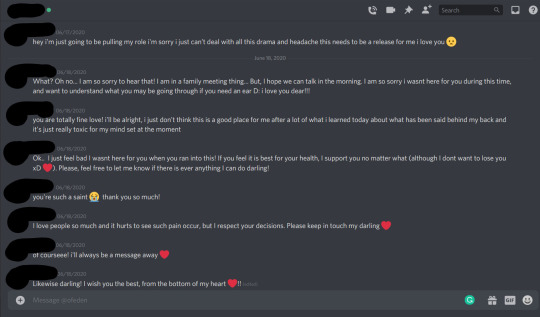
the other member reportedly “kicked” peacefully pulling their role:

and here is ludo manipulating the situation to make it sound non-peaceful:
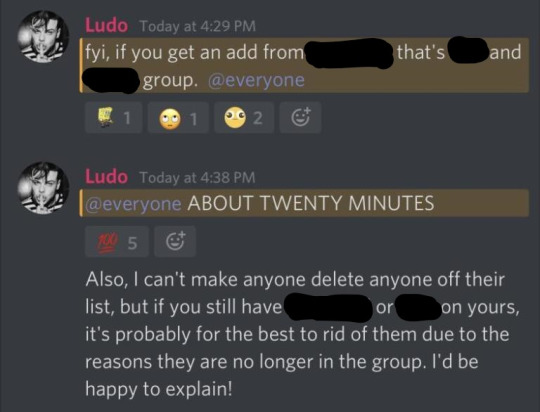
and ludo lying in a bulletin saying said members were “kicked out”:

now we have ludo speaking about his alts. here he is admitting to having a freelance (non-affiliated account):

ludo admitting to being another “member” of one of us, mars:

ludo admitting to using mars just to lure another member into shipping with them:

one of ludo's alts:
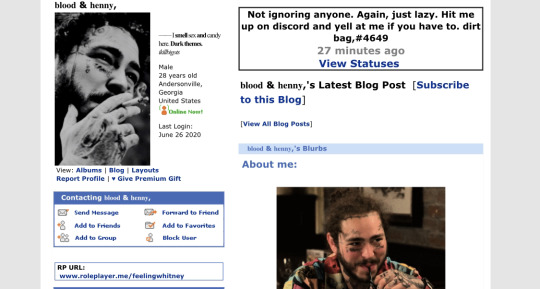
ludo posting one of us promos on his alt:
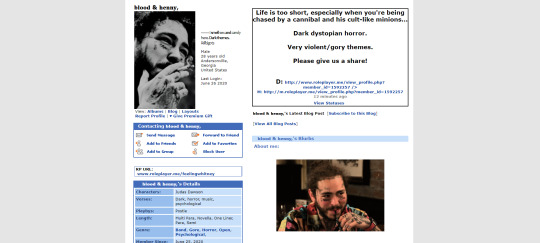
proof of one of us promo:
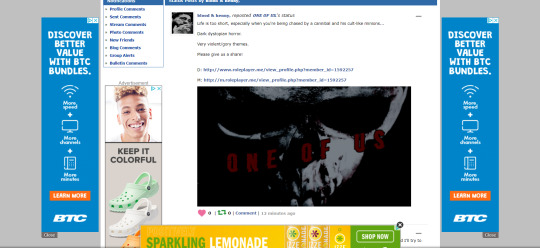
another one of ludo’s alts:
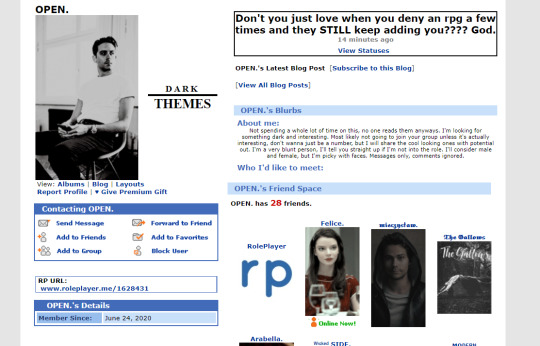
now lets get into his harassment and toxic behavior. here we have him harassing another member (18 YEARS OLD) through instagram dms:

(his instagram is rather well known with many members and he likes to post his music to make his members listen to which is connected to his instagram)
this shows ludo mixing ooc with ic and straight up lying about another member:

here one of his targets of harassment expresses their fear of him possibly stalking them:

the group owner from another group ludo was in countering ludo’s claims to peacefully leaving said group (reminder, ludo is damien):

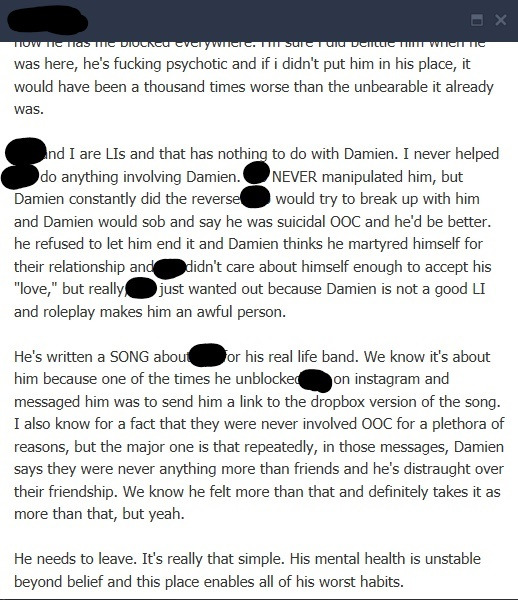
a conversation between the owner of said group above and ludo about his harassment and stalking, as well as him shittalking to manipulate other people into believing his narrative:
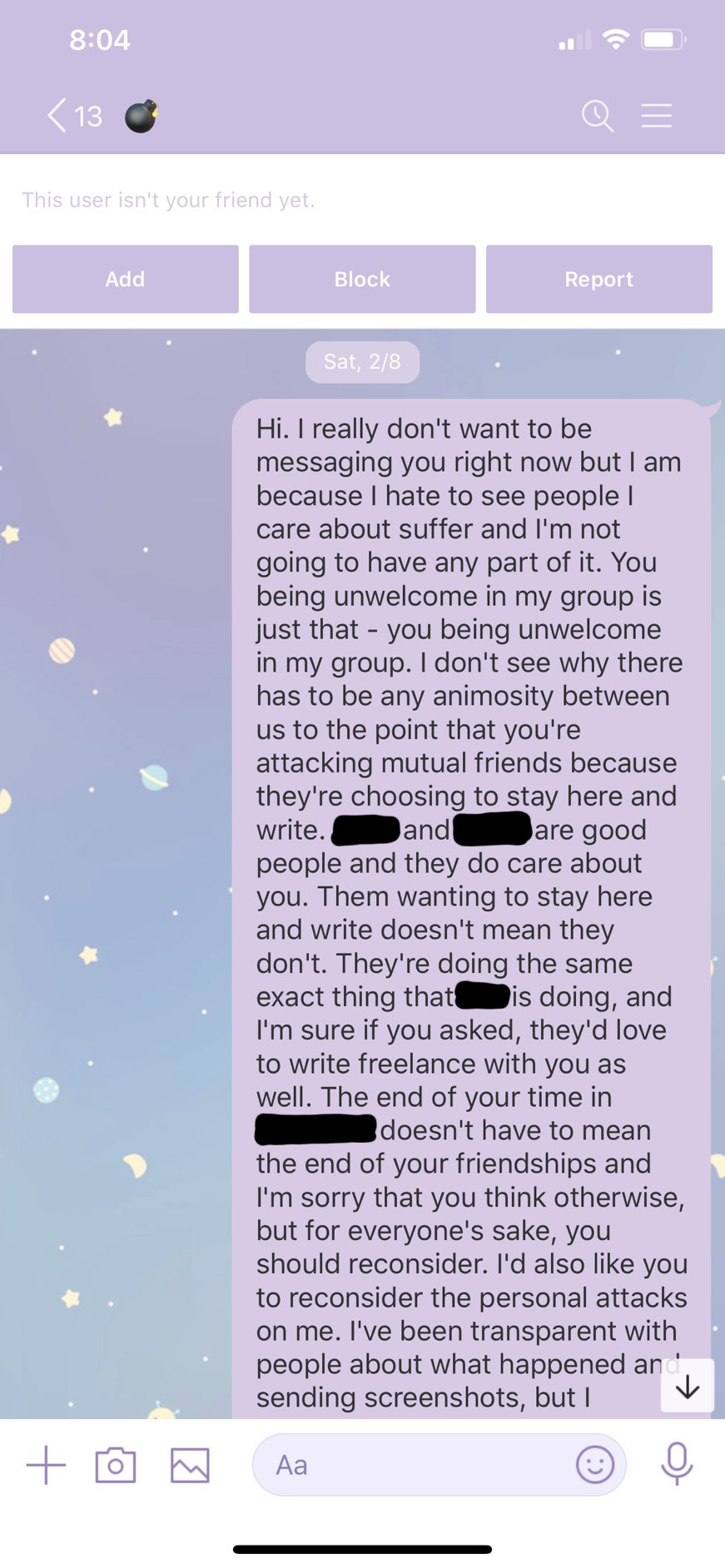
here ludo tries to act like the victim and gaslight the owner:
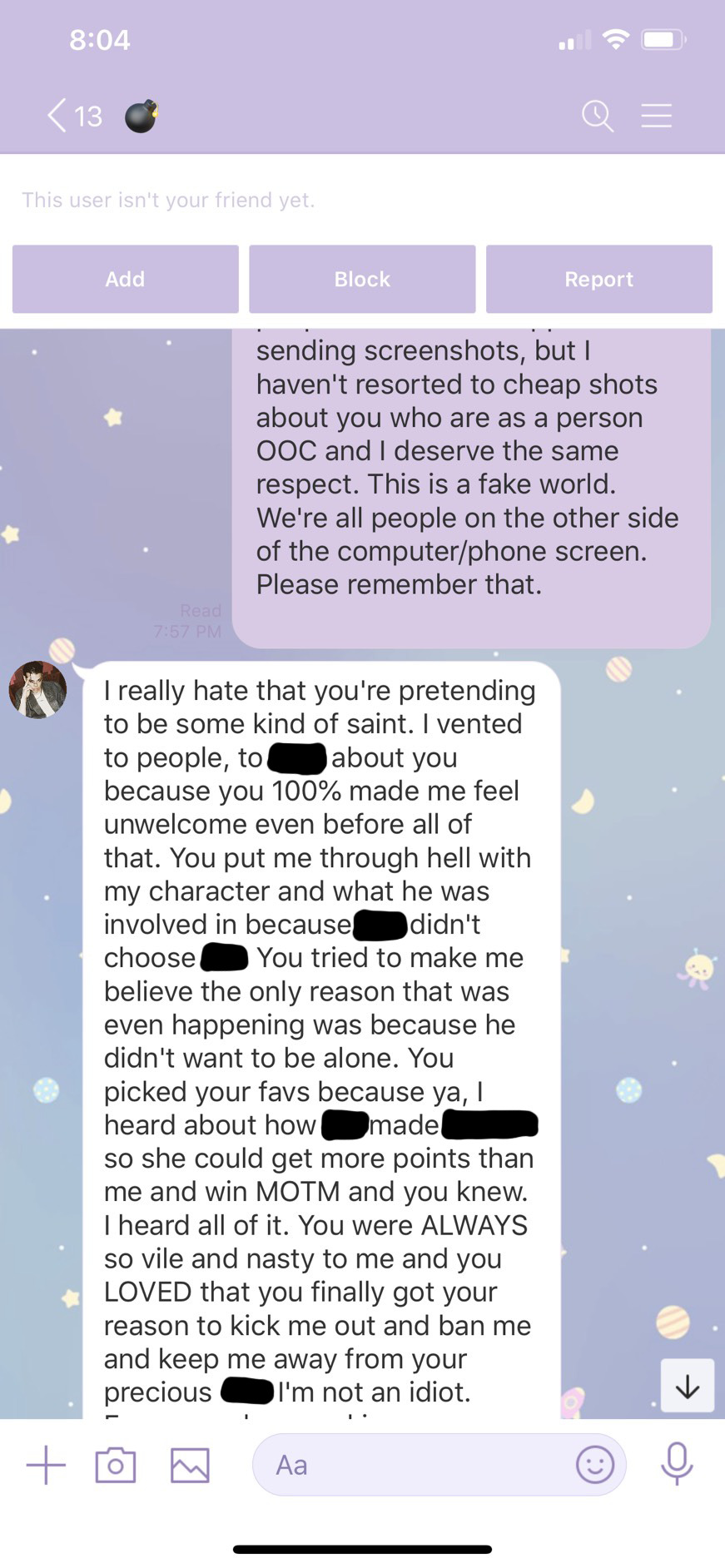
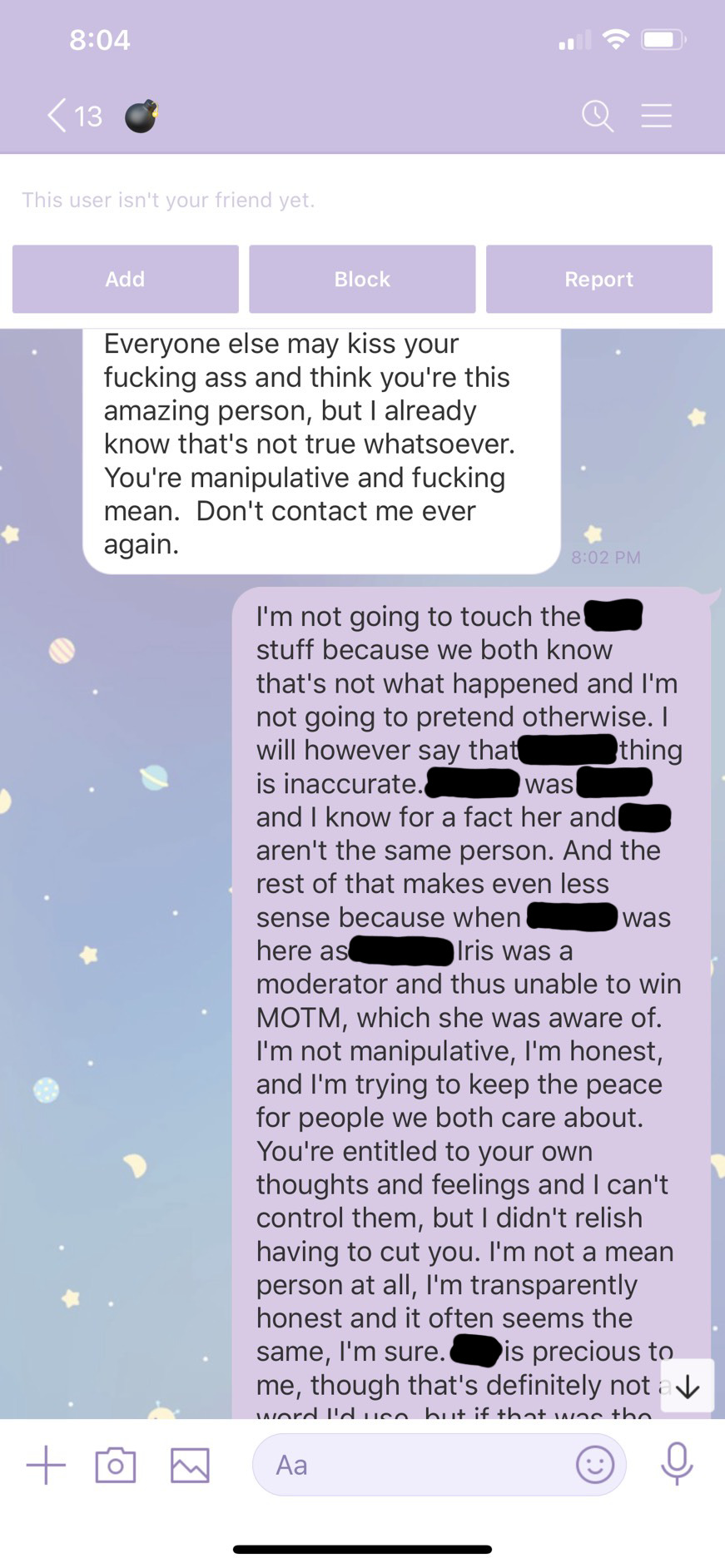
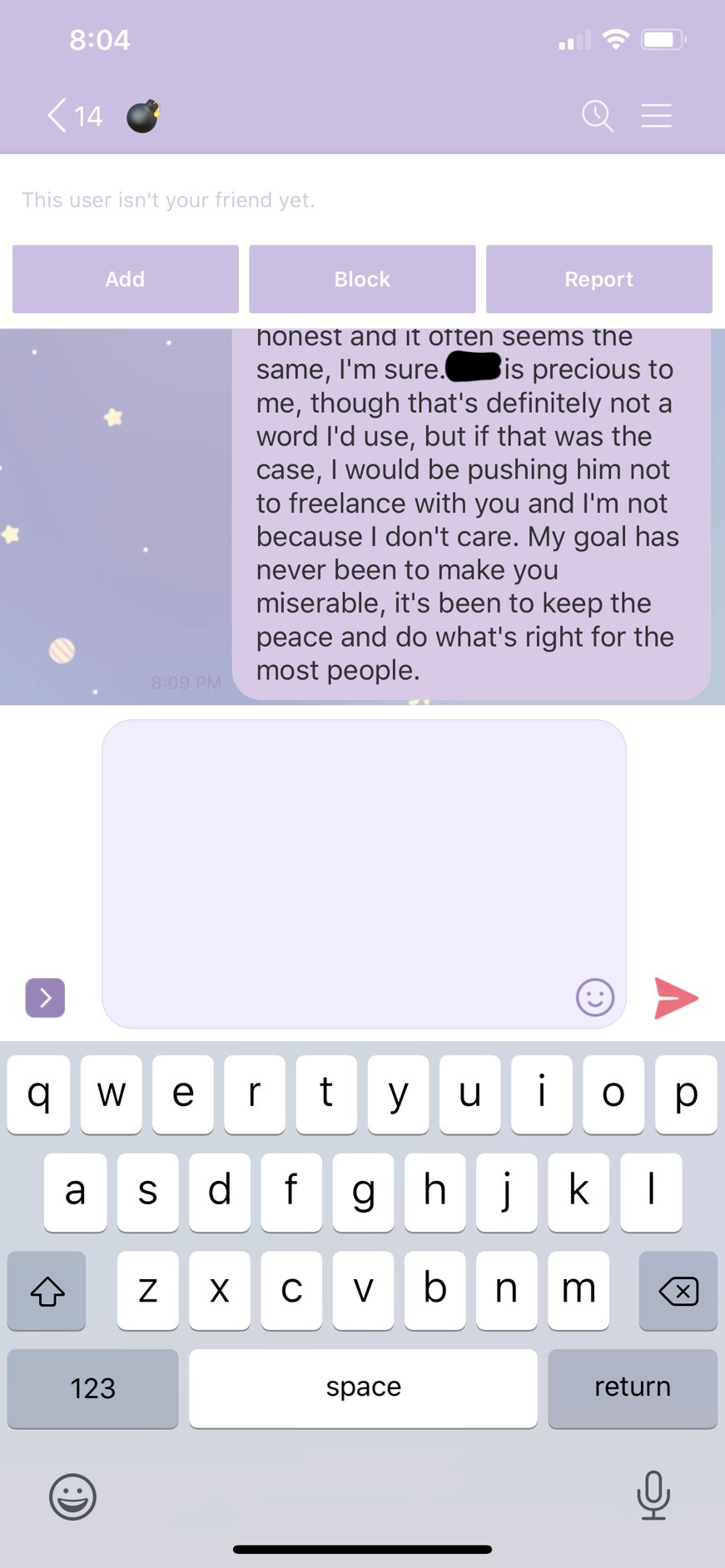
here is proof ludo makes his “enemies” into villains for one of us and portrays them in a negative light (the name he used is their real name, making this 10x worse):

explanation from an rp ex of ludo’s about the harassment they suffered:
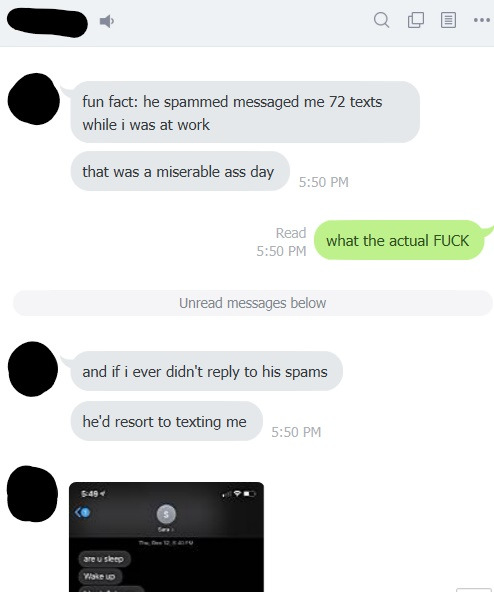
the screenshot shown above:

ludo harassing an rp ex over instagram dms and displaying classic abusive behavior (reminder, he has his instagram rather public to his members):
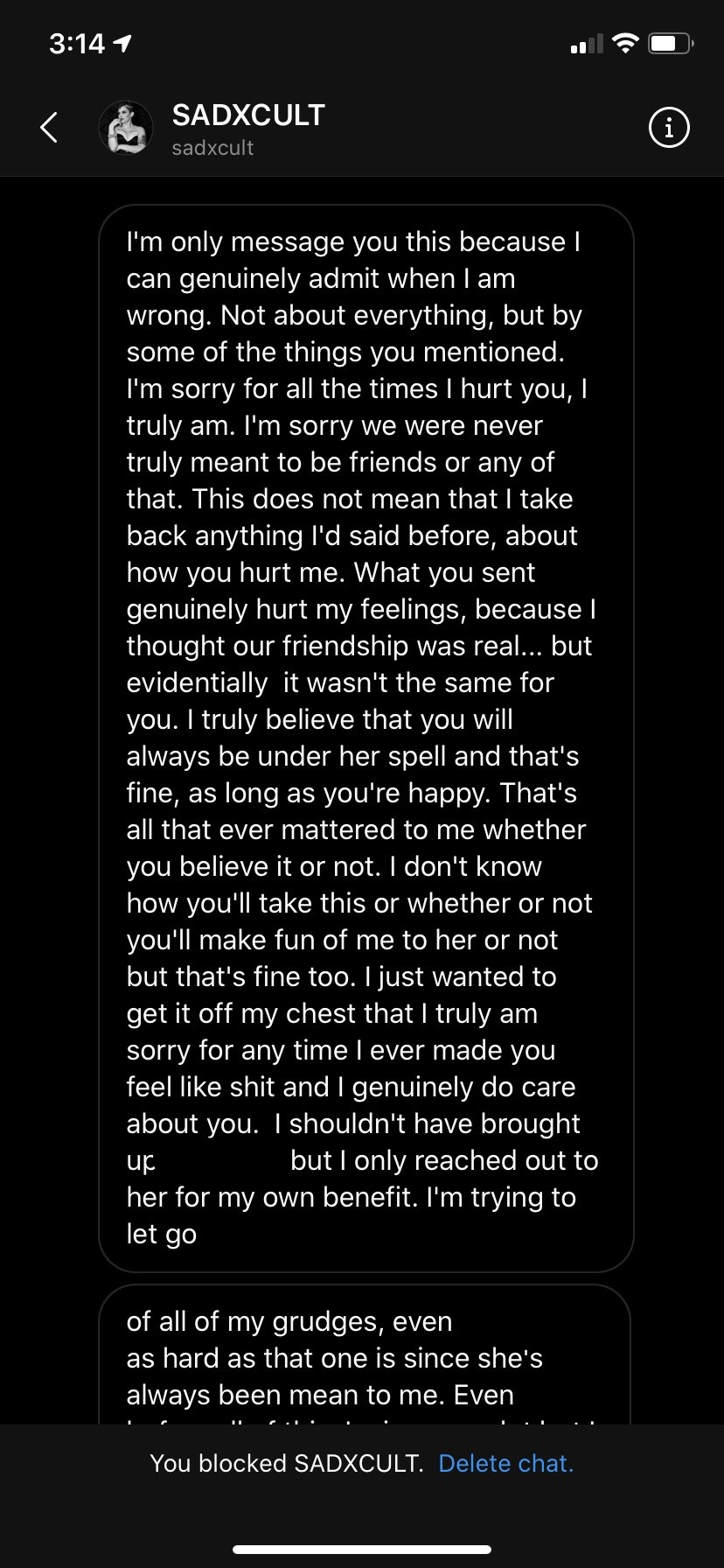
"i can genuinely admit when i am wrong" implying their ex cannot. also gaslighting because he can't admit when he's wrong. this will be further highlighted through these instagram messages.
"this does not mean that i take back anything i've said before, about how you've hurt me" contradicting himself when he said he can genuinely admit when he is wrong.
"i thought our friendship was real... but evidently it wasn't the same for you" guilt trips. the rest i'm sure you can pick out on your own. it's all very obvious.

"we're no good for one another. you hurt me a lot and i hurt you a lot." not taking responsibility and instead pulling the
"we are the same, you and i" trope to minimize his responsibility.
also further guilting them by writing a song about how they "abused" them.
description: "Emotional abuse is just as bad as physical. Ask for help."
(fun fact, i discovered this song before my birthday and related to it so much. it brought me to tears. fucked up it was used against someone in a moment of manipulation to make his target feel bad. peep the suicidal ideations in the lyrics)
ludo using an incident in their life against them:

"i miss you. also not like that matters" passive aggression and guilt trips.
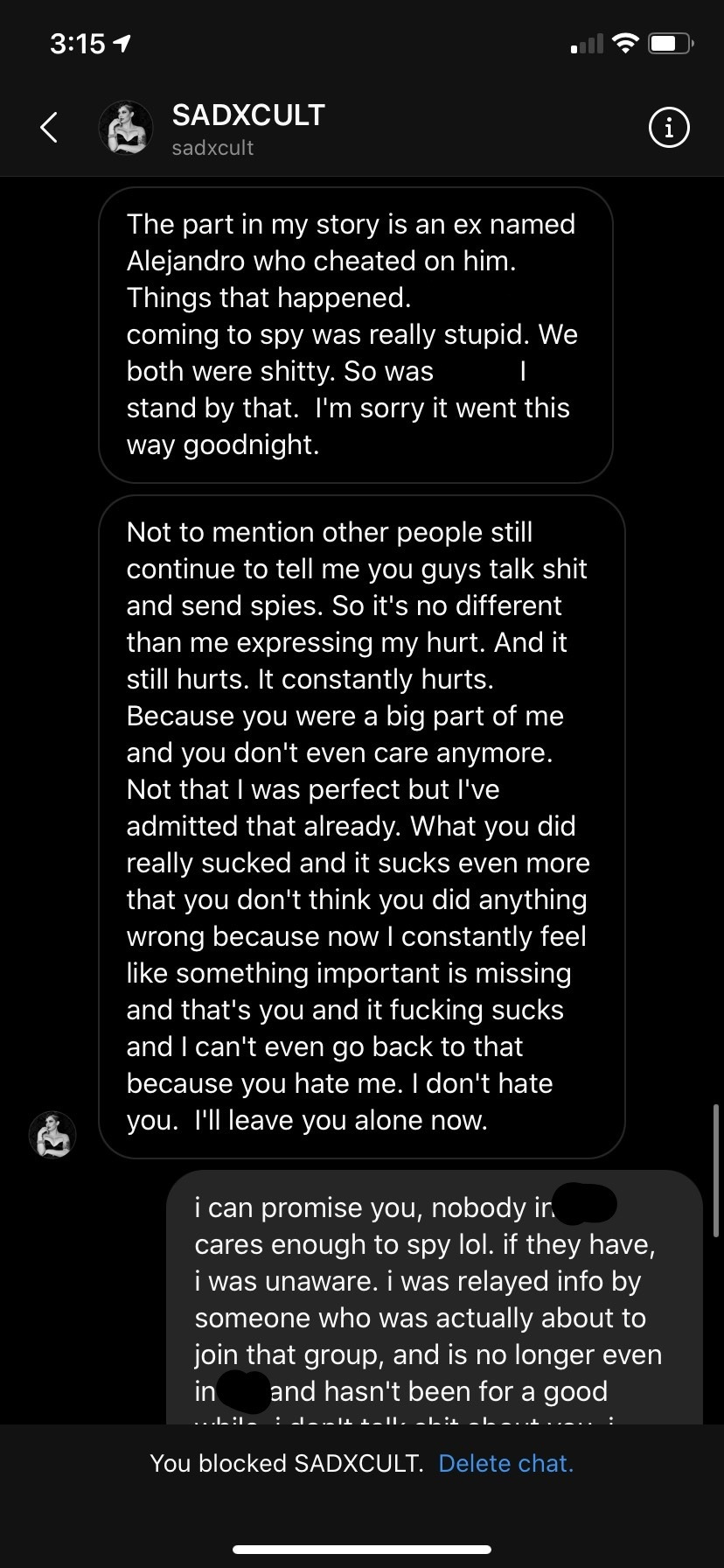
gaslighting about spies. guilt trips. also admitting to using exes' names in his storylines.

more guilt trips. more gaslighting. more excuses for exhausting his partner.
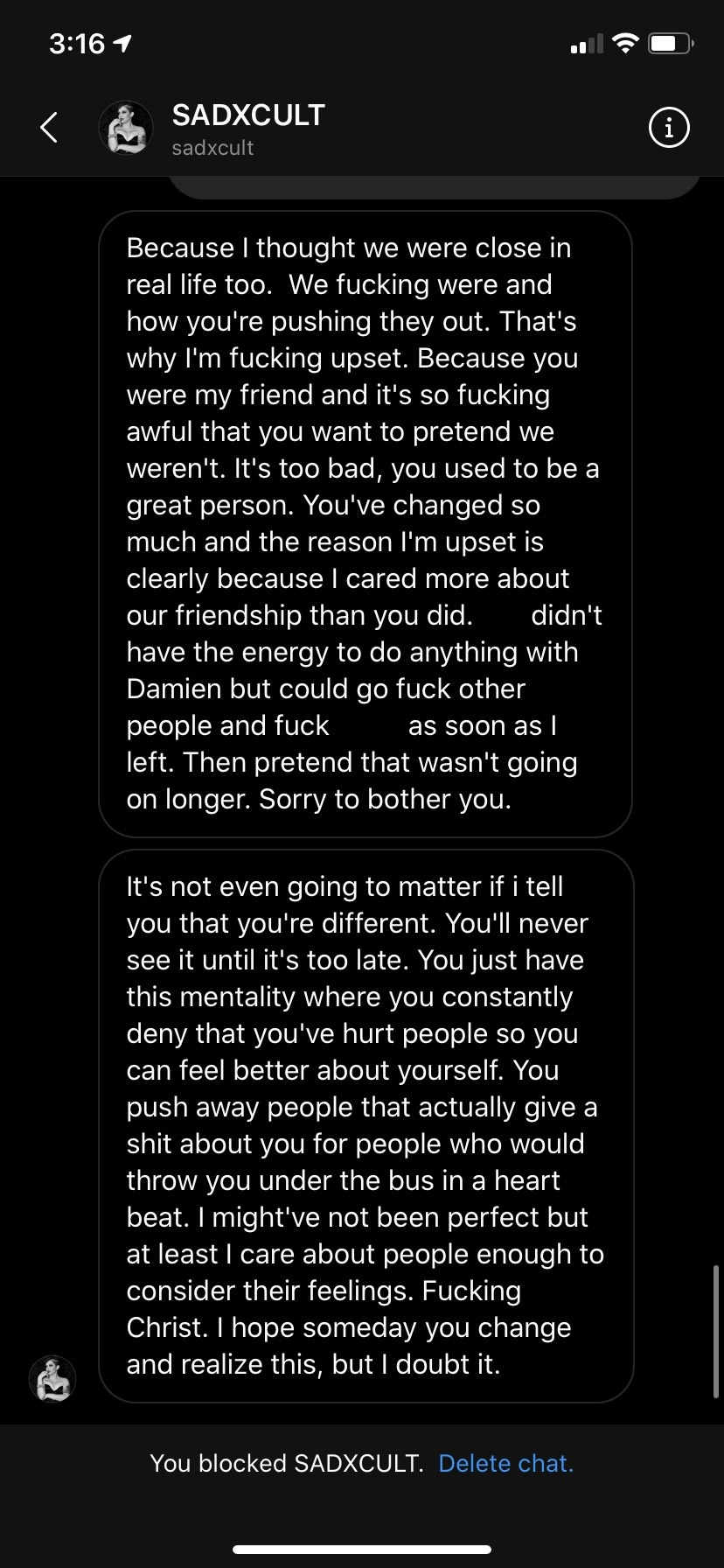
projection: "you just have this mentality where you constantly deny that you've hurt people so you can feel better about yourself."
gaslighting by trying to make their ex's friend sound like they would "throw [them] under the bus in a heart beat")
here ludo is guilting their ex friend from above on line for not spending enough time with them:
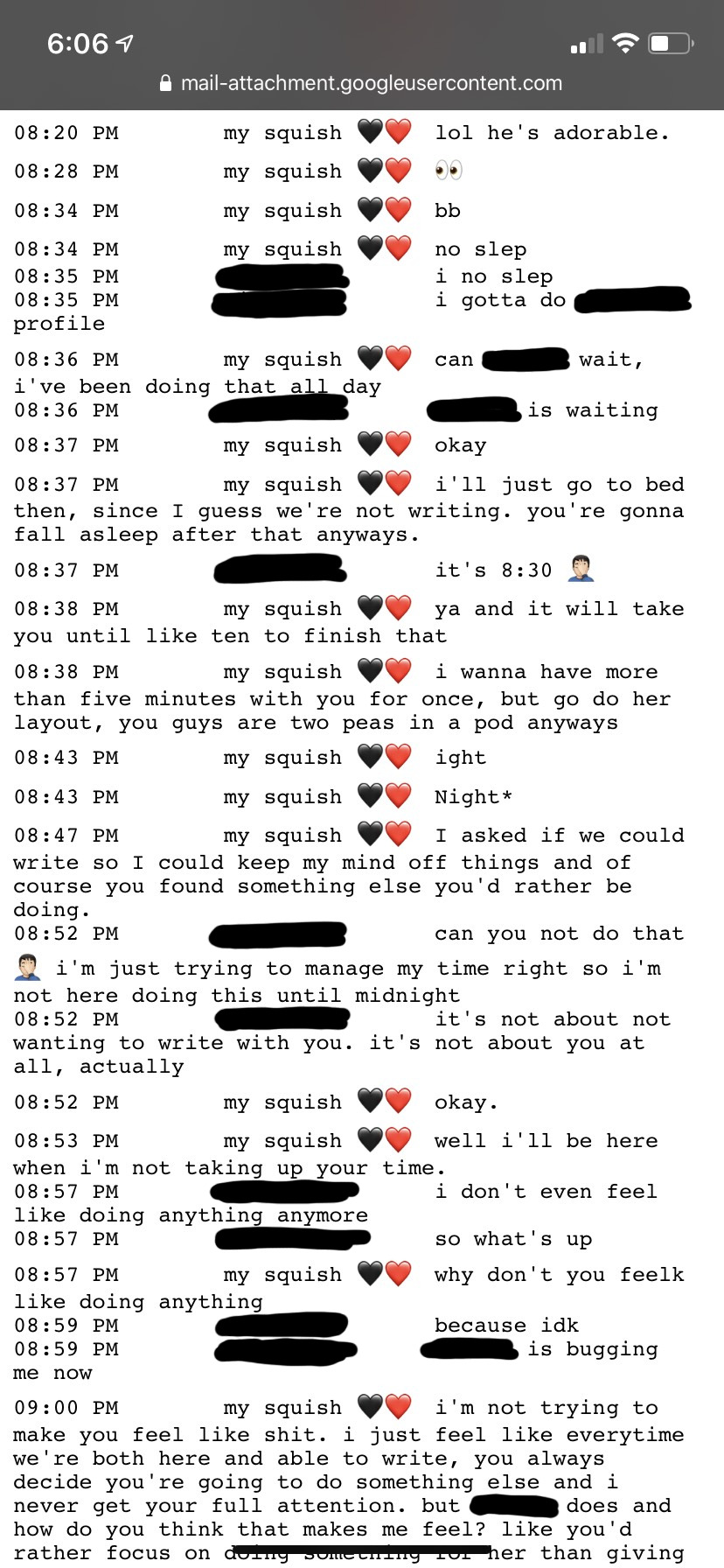

self deprecation used to manipulate them.
here is a diagram shown to me by one of ludo’s ex friends:

they further detail their testimony in this google doc
and the text messages (between ludo and one of the members who pulled their role peacefully while ludo tried to say they were kicked) below will show you exactly what they mean:



using other peoples’ feelings to manipulate them:
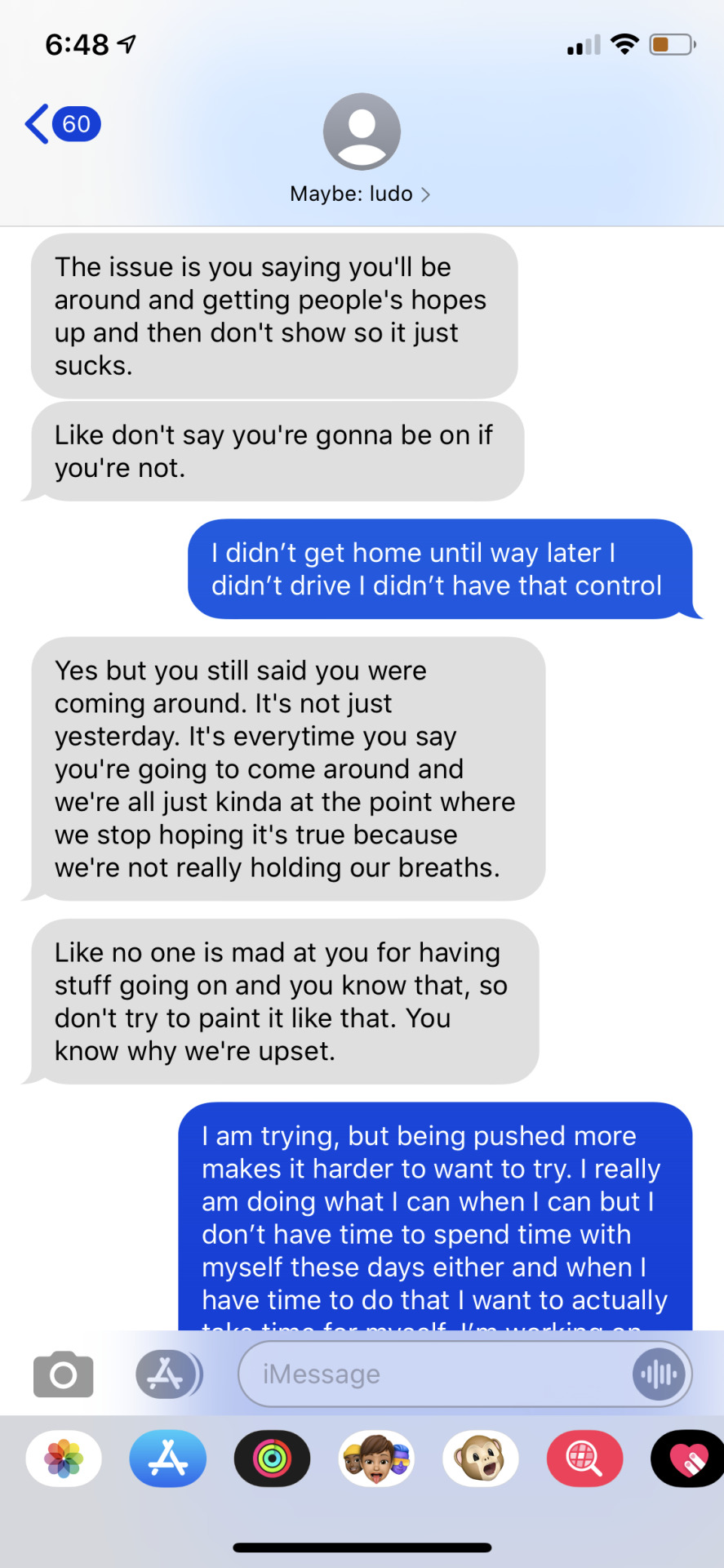
dismissing the stress they are under with real life, gaslighting by saying they haven't done the effort when they are clearly burnt out. aggression:
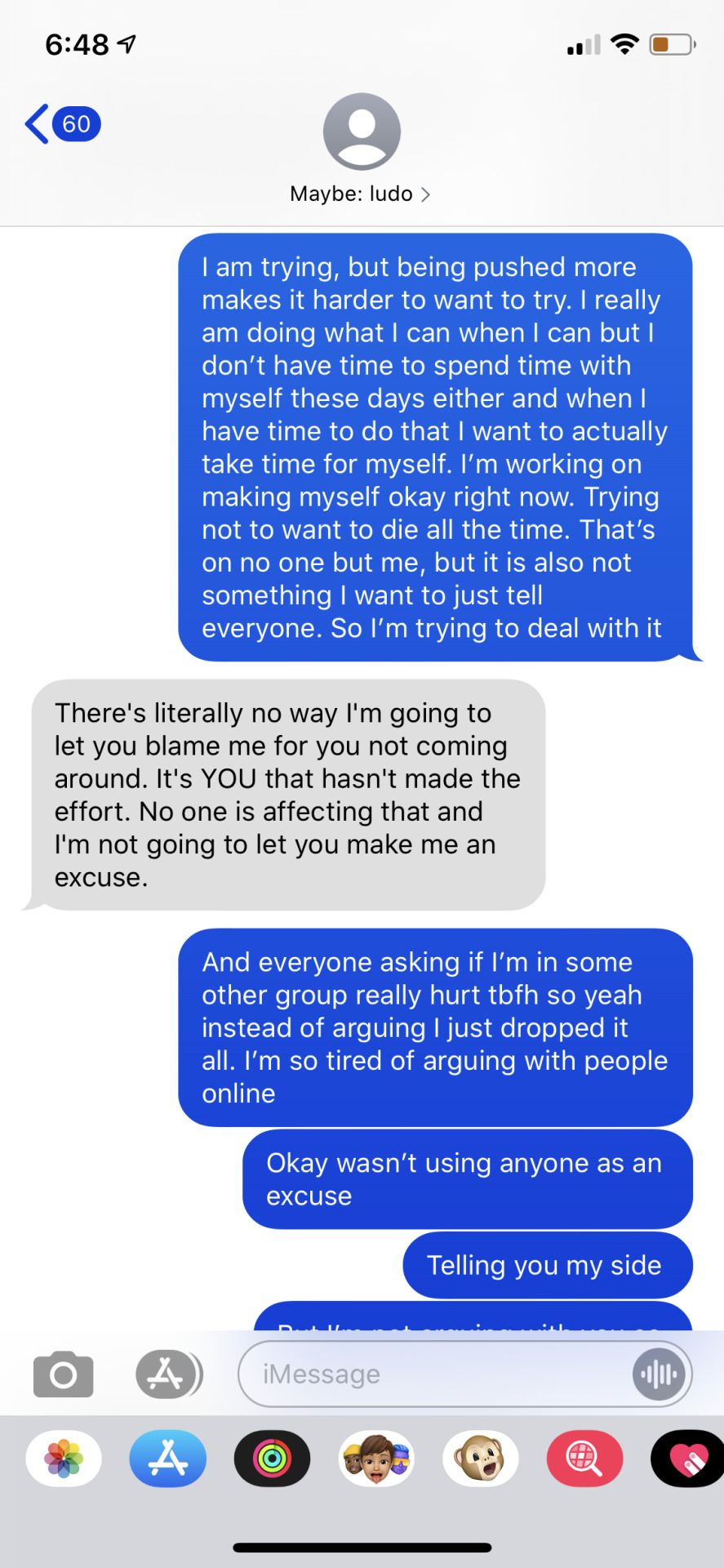
guilt trips:

pushing them away. guilt trips. using others feelings to manipulate them. gaslighting by asking a clearly passive aggressive question and saying it's "genuine":
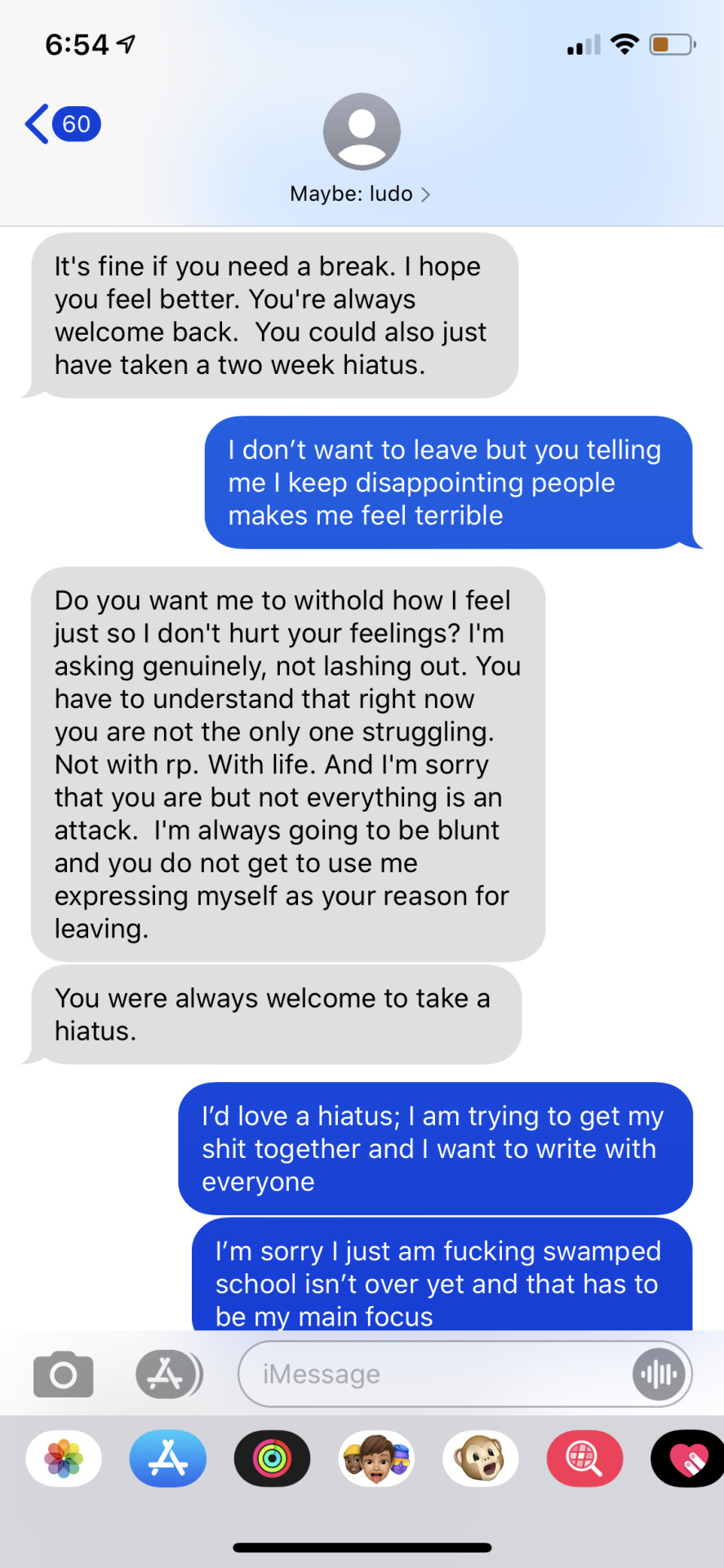

"i'm just relaying my personal frustrations" when he already has time and time again. let it go, damn. give them a break. stop being overbearing.
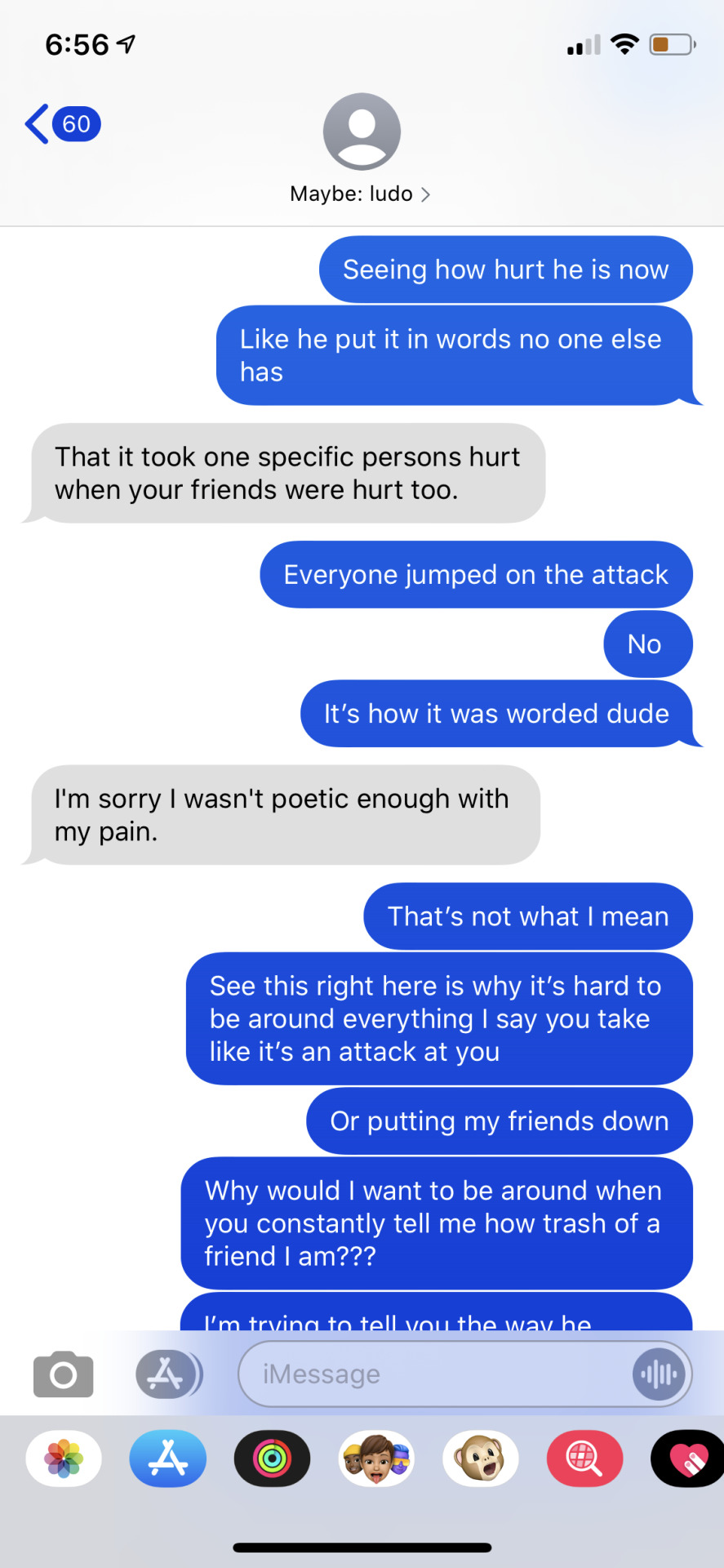
passive aggression. implying he means less to them when they are saying their friend put it into words they could understand.

blaming them coping with his abuse on them. that's like telling someone shouldn't retaliate to abuse because their retaliation is "hurtful" YOU DON'T GET TO TELL THE PEOPLE YOU ABUSE TO NOT RETALIATE AGAINST YOUR ABUSE.
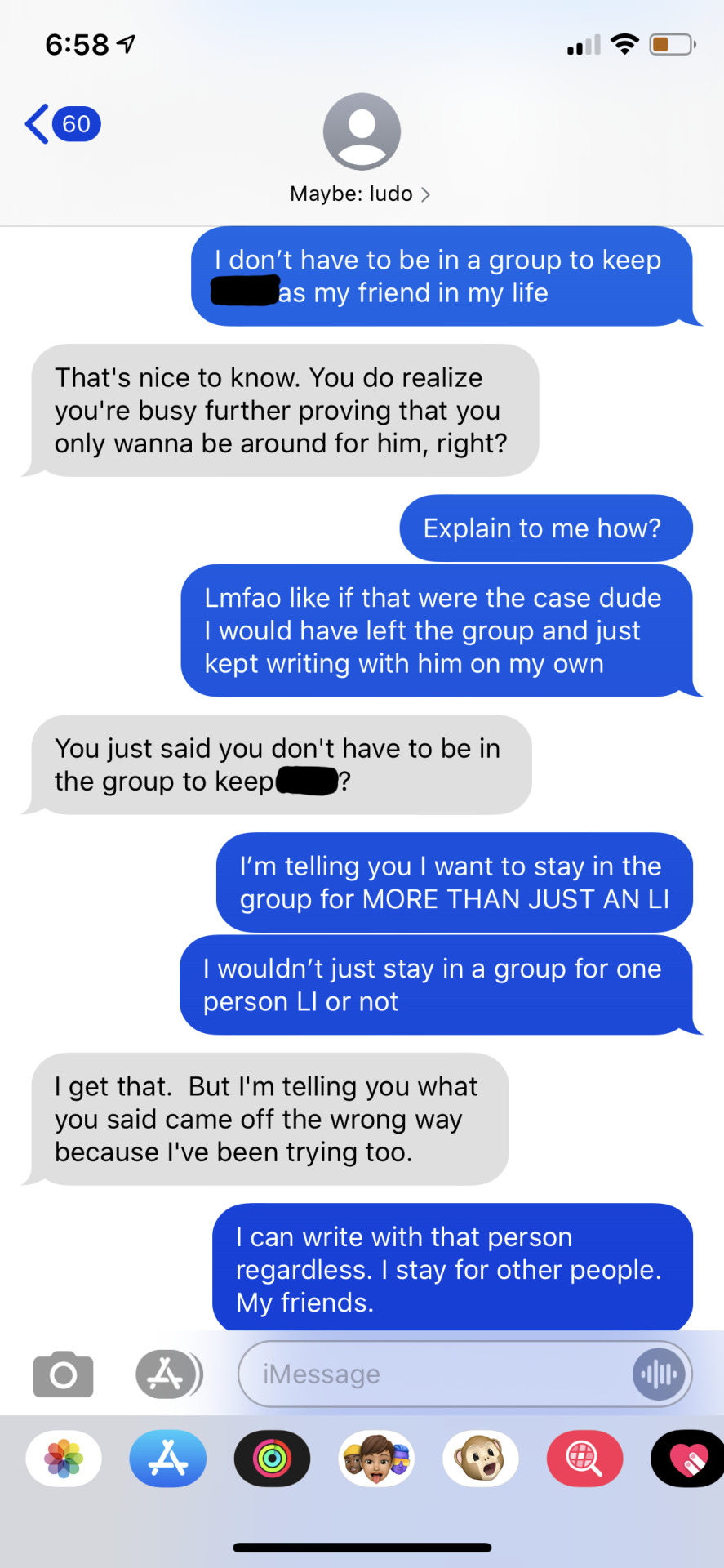
twisting words. not taking responsibility for his lack of understanding and instead saying "what you said came off the wrong way". not their fault that you didn't get it.

this. THIS is what sent me. how DARE you use your mutual disorder as a way to guilt and manipulate. i have the same exact disorder as well and guess what? all THREE of us are different people. and don't say "change who i am" as if it's a BAD THING. YOU are the reason everyone leaves you. YOU are the reason no one wants to be around you. YOU are the reason you can't keep stable friendships. YOU DON'T GET TO FUCKING PULL THAT BULLSHIT. if you care for someone you will work on your goddamn self. you expect everyone else to change for you, but you can't do the same goddamn thing? IF YOU GAVE A SHIT YOU'D STOP THE BEHAVIOR THAT IS HURTING THE PEOPLE YOU CLAIM TO CARE ABOUT. FULL. FUCKING. STOP.
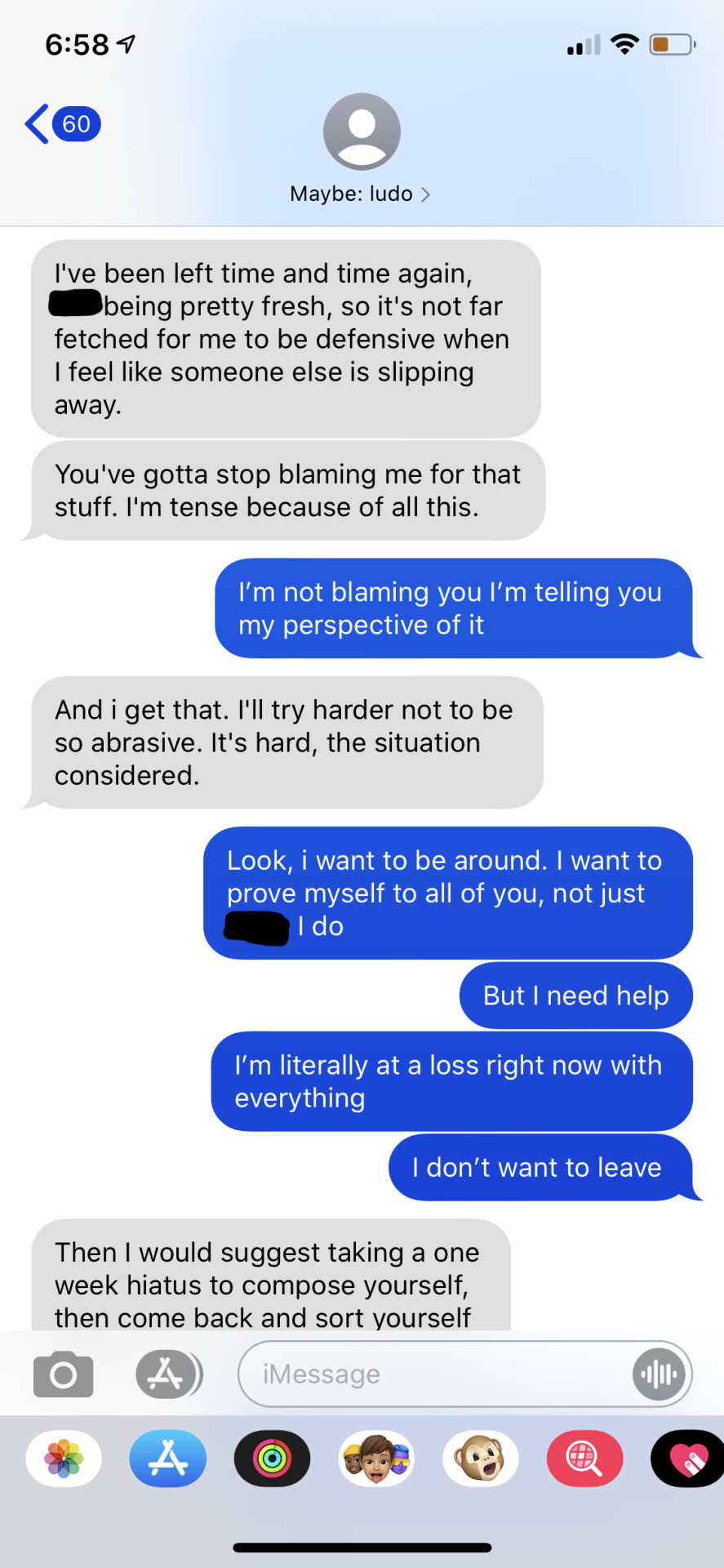
guilt trips. pity.
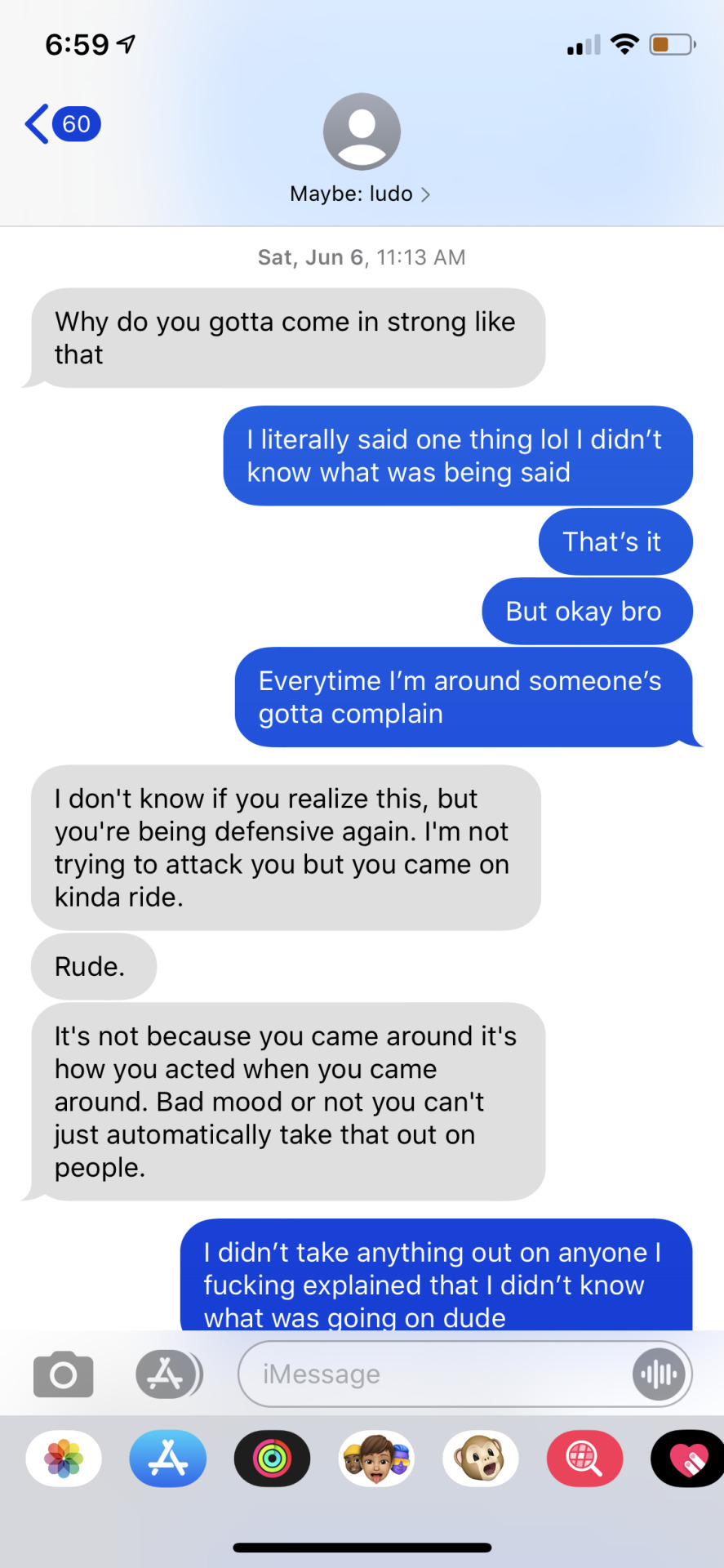
condescension. lose lose situation.
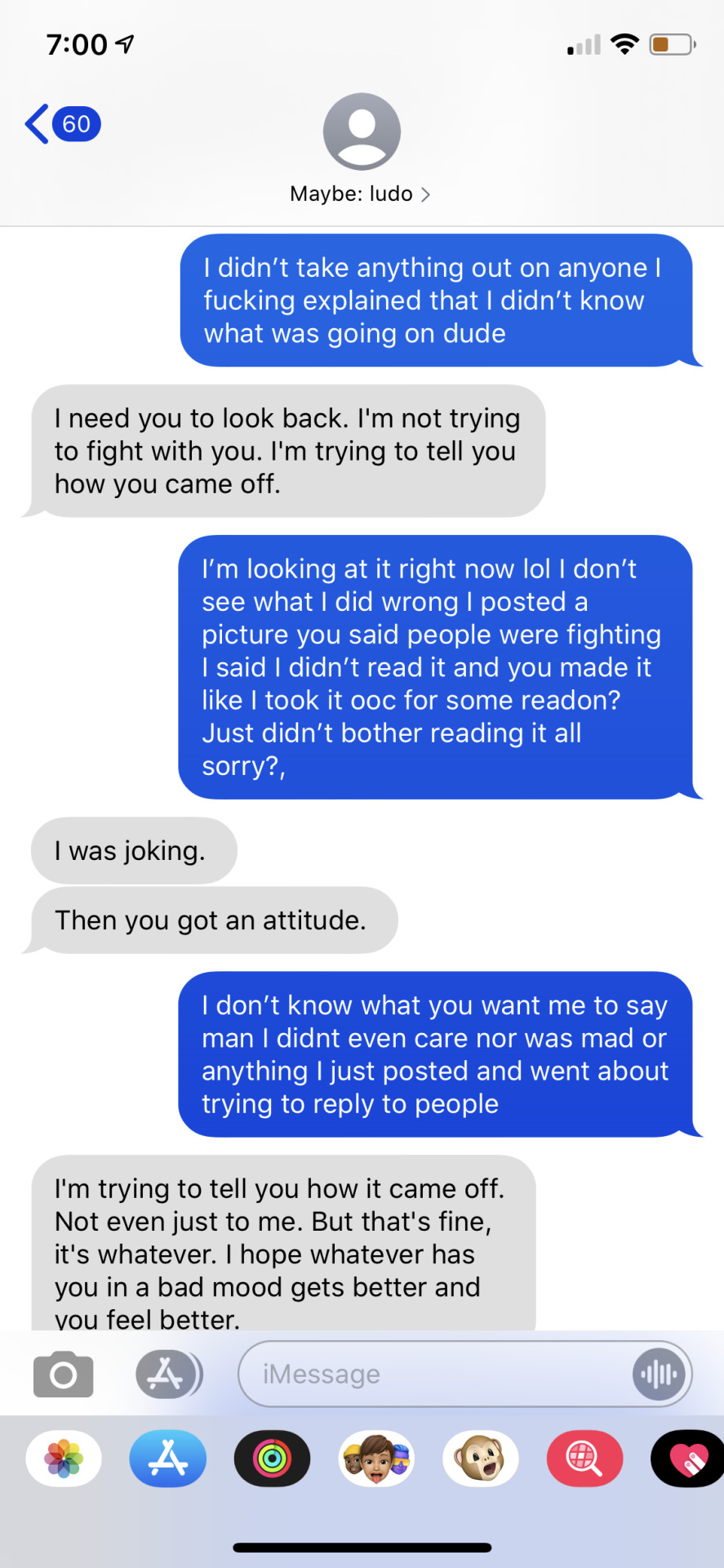
"IT WAS A JOOOOOOOOOKE" excuse.
"but whatever. i hope whatever has you in a bad mood gets better and you feel better" passive aggression. pretending to care. fake comradery.
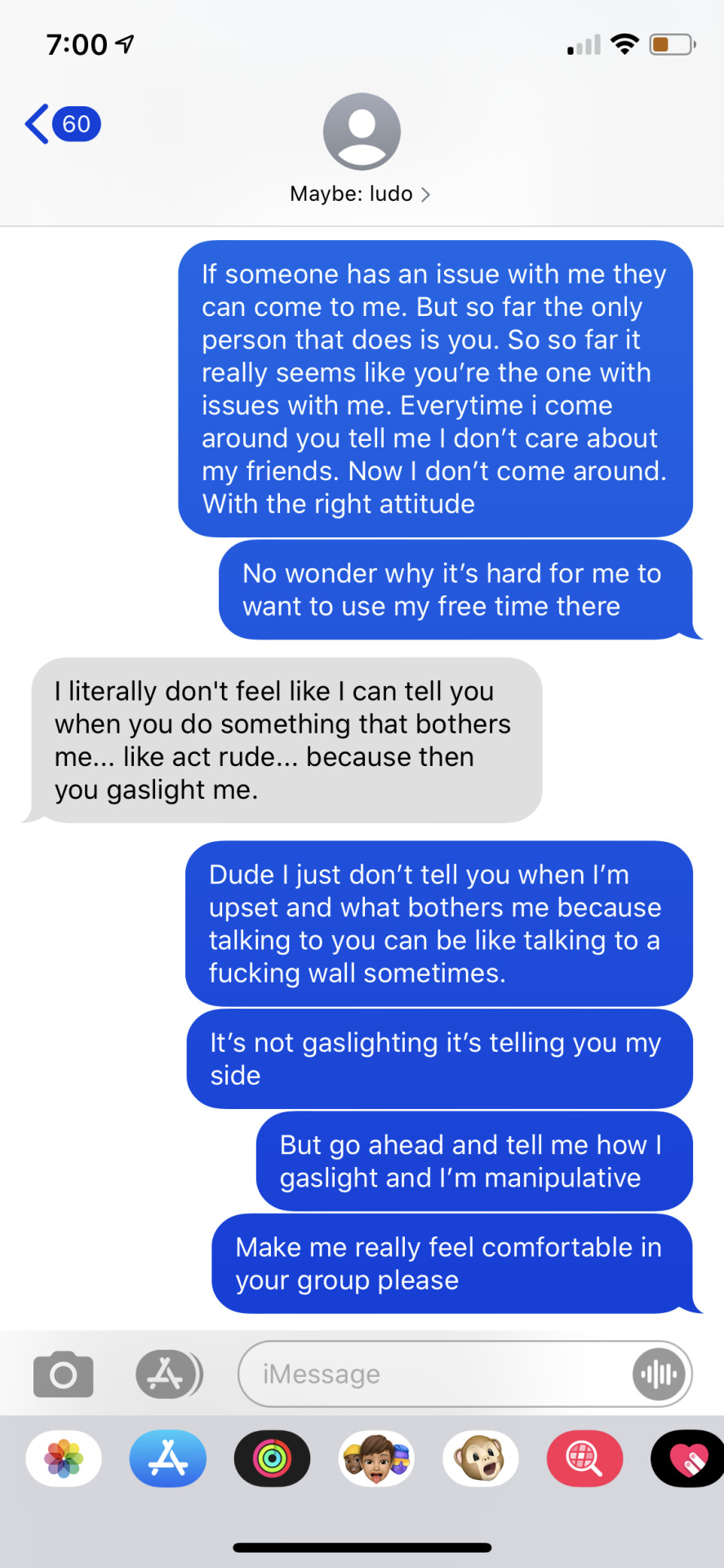
"you gaslight me" is a form of gaslighting, especially when there IS NO GASLIGHTING. this is also an example of projection.
making them walk on eggshells.

"i'm willing to sort it out of you stop being defensive" punishment and reward.
"i'm sorry IF..." not taking responsibility.
"this was my response" ie: this is your fault i'm acting this way, when he is the abusive one.
"you constantly use my natural reaction as your excuse for not being around..." YOU ARE RESPONSIBLE FOR YOUR REACTIONS WHEN YOU ARE THE ABUSER. STOP HAVING THIS "this is me take it or leave it" ATTITUDE AND THEN WONDER WHY EVERYONE FUCKING LEAVES YOU.

gaslighting. trying to say they were not coming around BEFORE he started calling them a shit friend.
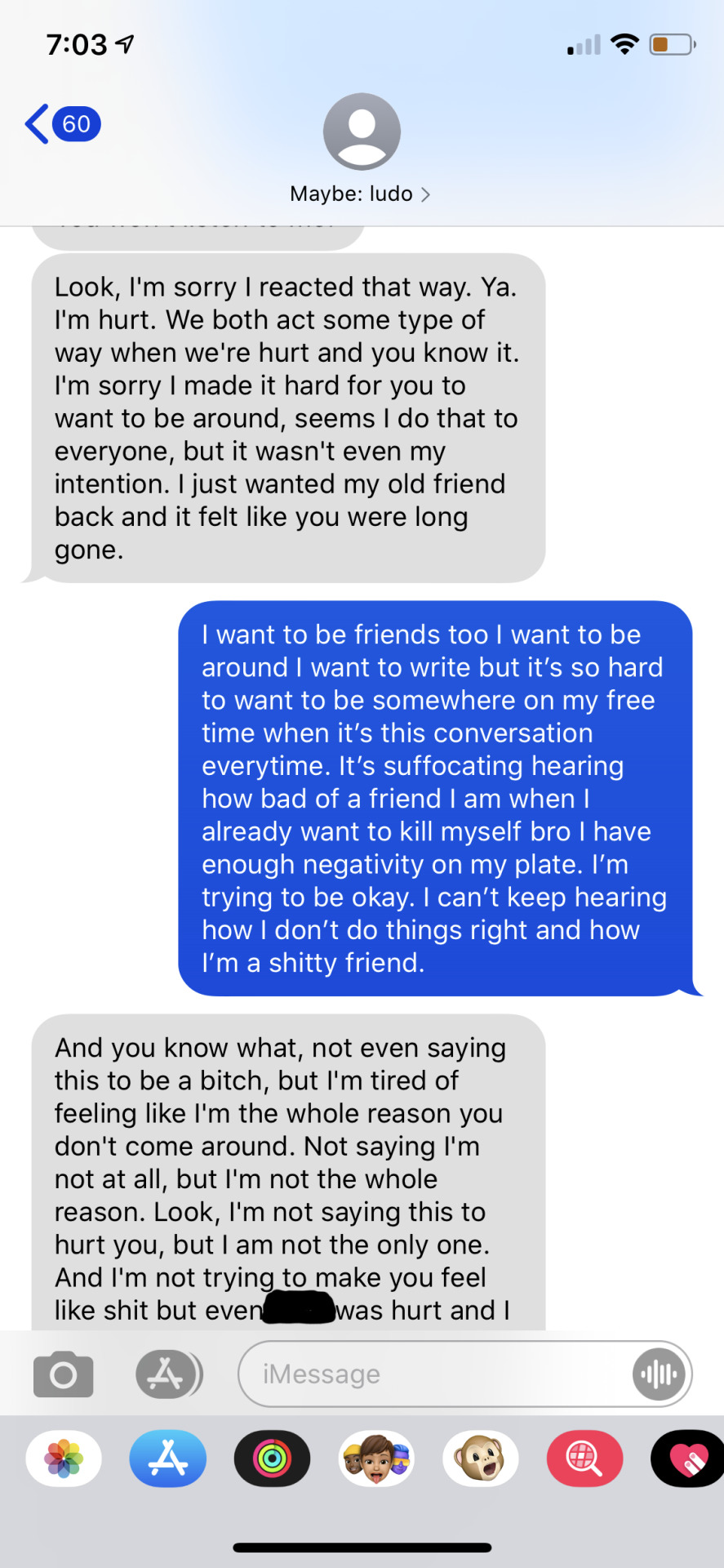
"we both act some type of way when we're hurt and you know it" gaslighting, using their mutual disorder against them. AGAIN. YOU (ludo), ME AND THEM ARE THREE DIFFERENT PEOPLE WITH THE SAME DISORDER. stop acting like y'all the same goddamn PERSON. stop PROJECTING YOUR SHITTY ACTIONS ONTO OTHERS.
"not even saying this to be a bitch" the "NO OFFENSE, BUUUUT" tactic to "lessen the blow" of the shitty thing he's about to say.
USING OTHER PEOPLE AGAINST THEM, AGAIN.


"it's the only way i know how to be" THEN CHANGE IT. GET HELP. STOP USING YOUR DISORDER AS A WAY TO GET AWAY WITH SHIT. therapy isn't a con, you are.

and then, after he knows he has no control over people, he pesters.
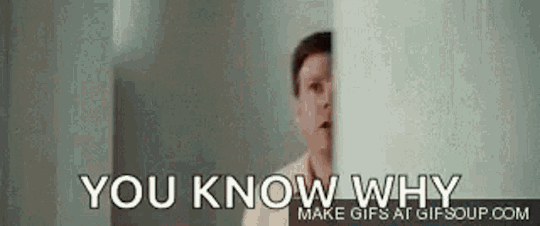
an ex friend requested this be used at the end. i feel it sums up the feelings of everyone ludo has wronged quite well.
5 notes
·
View notes
Text
Results From a Different Fanfic Community Survey (old, from Tumblr)
Hey everyone! I saw the survey post going around (thanks for doing that u/cephalopod11!), and it reminded me of a survey that me and my friend had done literally years ago on tumblr, but never got around to sharing! We were making a documentary about fandom for our senior project (yeah, i was cool in high school) but because of time constraints and lack of editing software/skills, we never actually finished the doc, and we never got to share the survey results. Which is a bummer, because it had over 2,000 responses. So I thought you guys might appreciate it! It might be interesting to view the results from tumblr and the results from reddit side by side to get a more accurate view of fanfiction readers all over.
I typed up a summary of the most relevant questions but you should be able to view the google generated summary here (which is also proof of the response numbers and things like that lol). There are a lot of questions at the end about reader insert fanfiction because for some reason that was going to be a big segment. Legitimately i cannot remember why we thought that was an interesting or good idea, but we also have another survey we did just for people who read reader insert stuff if anyone is interested in that.
A few other things to keep in mind:
Our questions were kind of badly worded, which is unfortunate since we got so many responses.
Since we were in high school we definitely had an age bias which is very clear in the how old are you question lol.
This was done in march of 2018 so the data is 2 years old.
I think it got reblogged by a big drarry account which may have skewed all the numbers towards the Harry Potter fandom specifically. So is any of this accurate?? God only knows.
maggie if you are reading this, I'm sorry i didn't ask first before i posted this but I knew you wouldn't care and also you take forever to respond to texts. sorry love you lol
Question 1: How old are you?
12 or under: .8% (19 responses)
13: 3.9% (90)
14: 6.3% (146)
15: 9.7% (223)
16: 10.2% (234)
17: 9.8% (227)
18+: 59.3% (1,366 - clearly we made a huge mistake with this question lmao)
Q2: If 12 & under or 18+, what is your exact age?
(We had people write these in, but I’m compiling them into age groups for simplicity. 1,205 out of 1385 who were supposed to wrote in)
11: 5
18-24: 757
25-34: 327
35-44: 52
45+: 23
The oldest response was 62!
Q3: What is your gender?
My biggest regret with this whole survey was not differentiating between cis male/female and trans male/female. At the time we only really cared what gender people identified as and didn’t want to differentiate but now I wish we had that data. :(
Female: 80.4% (1,853)
Male: 4.2% (97)
Non-Binary: 9.9% (229)
Prefer not to say: 3% (63)
Other (these responses ranged from “questioning” to “what is gender” to “i dont knoooooow): 2.5%
Q3: What is your sexuality?
I was a dumbass and forgot to put asexual- some people wrote it in but it the numbers for that are probably wonky
Bisexual: 32.9% (759)
Straight: 23.1% (533)
Pansexual: 13.9% (320)
Gay: 9.8% (226)
Asexual (write ins): 5.8% (134)
Prefer not to say: 5% (115)
Other: 9.5% (this was usually some more specific denotation of an LGB id)
Q4: What fandom, characters, or people do you read fanfiction about? Check all that apply
People could check multiple things, so these percents do not add up to 100
Harry Potter: 82% (1,891)
Marvel Cinematic Universe: 45.5% (1049)
Sherlock: 33.3% (767)
Supernatural: 25.9% (598)
Star Wars: 21.1% (486)
Yuuri! On Ice: 19.3% (445)
Marvel Comics (including cartoons like Ultimate Spider-Man): 18.2% (420)
YouTubers: 15.4% (354)
Star Trek: 14.1% (324)
Doctor Who: 14.1% (324)
There were a ton more but those were the top 10. I think you can see all of them on the google generated results.
Q5: What fandom, character, or person do you read the MOST fanfiction about? Please only write one
Again, I regret the wording on this one. Should’ve just been fandom. Also, we should have just had them select from the same list because the write-in is a nightmare.
Harry Potter: 682
Sherlock: 68
Supernatural: 51
MCU: 44
Star Wars: 40
There’s literally over 1,000 more responses that are impossible to sort. Sorry :(
Q8: Which relationship/pairing/orientation types do you regularly read? Check all that apply:
Male/Female Relationships: 51.6% (1190)
Male/male relationships: 89.7% (2069)
Female/female relationships: 48.4% (1115)
Multi - more than one kind of relationship, or a relationship with more than 2 partners: 42.2% (974)
General - no romantic or sexualrelationships, or relationships which are not the focus of the main work: 39.5% (912)
Q9: Which relationship/pairing/orientation do you MOST OFTEN read?
Male/Female Relationships: 12.7% (292)
Male/male relationships: 72.8% (1,679)
Female/female relationships: 4% (92)
Multi: 4.2% (97)
General: 6.3% (146)
Q11: Where do you MOST OFTEN read fanfiction?
Tumblr: 9.6% (222)
AO3: 76% (1,752)
FFN: 7.2% (165)
Wattpad: 6.3% (145)
Other: .9%
Q13: Which rating do you MOST OFTEN read?
General Audiences/K: 3.4% (79)
Teen & up/T: 25.5% (588)
Mature/M: 43.4% (1,000)
Explicit/MA: 27.7% (639)
That’s all the relevant stuff! But there were 19 questions in total, so if you want to see the results of those and all of these in graph format, you can click on the link above and just click on “see previous results.” Enjoy!
submitted by /u/timelesslords
[link] [comments]
from FanFiction: Where Magical Ponies battle Imperial Titans https://ift.tt/3aCWeEV
0 notes
Text
How to Write an Ebook: 21 Dumb Mistakes to Avoid in 2020
Want to learn how to write an ebook like a pro? It’s not just what you do, but what you DON’T do that can make or break your work.
Admit it.
You’ve thought about writing an ebook.
In fact, you’ve already imagined the front cover.
You can see the main title and, underneath, your name.
And when you picture it, you feel a ripple of pride.
An ebook would be a big step up for you as a writer.
Because while blog posts and freelance writing gigs are great ways to express your ideas and earn a side income, you can’t help feeling they’re a little, well, fleeting. Lightweight even.
But your own ebook? That’s more substantial. It’s taken more seriously. It has more gravitas.
And having an ebook with your name on the front transforms you from a mere writer into that more impressive beast — an author.
But how do you become an ebook author without falling victim to the same mistakes that sabotage the attempts of so many other writers and bloggers?
Why Most Ebooks Are Embarrassingly Bad
On the surface, writing ebooks seem relatively easy.
Lots of writers seem to be doing it, so how hard can it be?
But in reality, most ebooks that see the light of day are horrible. Embarrassingly bad.
That’s because your average ebook author doesn’t have a clue how to write an ebook. They can’t afford to hire a ghostwriter, and they don’t have the support system a traditional author would be given by their publisher when writing a book.
They do their best, but they don’t know what they don’t know.
The good news? We can learn from their mistakes. In this post, we’re going to show you the common mishaps first-time authors make when writing an ebook.
In other words:
Want to write an ebook like a pro? Avoid these 21 common mistakes:
Table of Contents: How to Write an Ebook Like a Pro (Don’t Do These Amatuerish Things)
Choosing a Topic You Know Little About
Writing the Ebook Your Audience “Needs”
Thinking Like a Writer, Not a Publisher
Picking Up Your Pen (or Laptop) and Starting to Write
Trying to Make Your Ebook Too Valuable
Starting at the Beginning
Only Writing When You Feel Like It
Letting Your Inner Editor Take the Lead
Quitting Just Before it Gets Easy
Trying to Keep Up The Momentum
Throwing Your Best Work in the Fire
Reviewing With a Microscope, Not a Telescope
Telling Yourself You Don’t Need an Editor
Hiring the World’s Worst Proofreader
Indulging Your Inner Perfectionist and Procrastinator
Assuming You Know the Best Format for Your Ebook Already
Using the First (Yawn-Inducing) Title that Comes to Mind
Designing Your Own Front Cover
Forgetting to Link Back to Your Blog
Completely Ignoring the Power of Social Proof
Acting Like Your Ebook Isn’t a Big Deal
Back to Top
1. Choosing a Topic You Know Little About
If you want to create a premium ebook, you can be tempted to pick a “hot topic” thinking that’s where the money is.
Likewise, when creating a sign-up bribe, you might think you need to entice readers with the latest information about an emerging topic.
And if you’re self-publishing using Amazon’s Kindle Direct Publishing (KDP), it’s easy to think you need to target one of the most popular categories.
But picking a topic like this is a BIG mistake.
If you know little or nothing about your chosen topic, creating an ebook will be a huge amount of work. You’ll have to do a ton of research on Google, interview experts, and perhaps even pay a real guru to get you up to speed.
What to do Instead
Write about something you actually know about — which almost certainly means tying your ebook to your blog’s core topic. You’ll not only save a ton of time on research, but you’ll also have a ready-made audience for your writing.
Back to Top
2. Writing the Ebook Your Audience “Needs”
I’ve fallen into this trap myself (twice) and I’ve seen a heck of a lot of other bloggers do the same.
It happens when you realize there’s a topic you know your readers need, and you know you can write the perfect book that will genuinely help them.
Sounds great, but people don’t always know what they need. And your sense of what it is might not be spot-on either.
What to do Instead
Don’t give your readers what you think they need. Give them what they know they want.
How? Run a survey, and ask your readers to choose between three or four ebook topics.
(This is also a good opportunity to find out how much they’d pay, whether they’re beginners or more experienced, and what specific questions they need your help to answer.)
Back to Top
3. Thinking Like a Writer, Not a Publisher
Planning isn’t just about deciding what you’re going to write and what order you’re going to write it in.
Because when you decide to create an ebook, you’re not just a writer; you’re also a publisher (and marketer). You have to write and publish.
If you don’t start thinking now about how you’ll sell your book — whether that means selling it to make money or just selling the concept to your readers — you’ll run into problems later on.
What to do Instead
Draft your sales page while you’re planning your ebook. Make it sound as attractive and useful as possible (try Jon’s list of power words, and make the reader the hero of the story) … and use that pitch to drive the writing process. This will make your ebook much stronger and will make your life much easier when you launch it.
Back to Top
4. Picking Up Your Pen (or Laptop) and Starting to Write
Once your survey results are in, you might be tempted to start writing straight away.
Whoa there.
Jumping into the writing at this point will cause you serious problems. You’ll find yourself repeating things, or wasting time exploring ultimately unhelpful tangents.
What to do Instead
Plan your ebook before you start writing.
This means having a clear outline that has, at the very least, a title for each chapter. Yes, that might seem a bit boring, but it will make the writing stage far easier (and more fun).
This doesn’t have to mean opening a blank Google Doc or Microsoft Word document and writing a linear outline. Try freeform brainstorming, mind maps, or index cards as creative alternatives to help get your ebook ideas flowing.
Back to Top
5. Trying to Make Your Ebook Too Valuable
With your first ebook, it’s easy to think you need to deliver the definitive ebook — the only one your audience will ever need.
If that sounds like a good idea, ask yourself this: “What will I give them next?”
Chances are, you won’t write just one ebook. You might write several in the same series, or you might create a short starter ebook for free, and then write a more advanced one to sell.
Even if your ebook is destined to be your subscriber incentive, if you give your readers everything they’ll ever need, why would they come back to your blog?
What to do Instead
Go back to your survey and determine what aspects your audience cares about the most. Focus on those. If you have lots of extra ideas, great! Keep them in a separate place and use them for your next ebook. Or explore them in a detailed blog post.
If you inadvertently miss something crucial, you’ll find out when you get feedback, and you can add a new section or chapter to address that point.
Back to Top
6. Starting at the Beginning
Although it might be the first chapter in your book, your introduction almost certainly isn’t the place to start writing.
It’s hard to know what to include until you’ve drafted the majority of your book, and you don’t want to get bogged down at this early stage.
If you start with the introduction, you’ll often end up writing far more than you need to. And let’s be honest. No reader relishes the sight of a long introduction — they want to dive into the real content.
What to do Instead
Don’t begin with the introduction; start with your first “proper” chapter. Once you’ve drafted the rest of your book, you’ll know what needs to go in the introduction.
Also, a lot of “introductory” material can go at the back of the book – I strongly recommend having an About the Author page at the back, because it’s a great opportunity to point readers to your website, mailing list, and so on.
Back to Top
7. Only Writing When You Feel Like It
Although your ebook is probably a high-priority project for you, it can be genuinely tough to carve out the time for working on it regularly.
But if you don’t write consistently, you’ll never build up any momentum. You may write for a few hours to begin with, but then end up taking weeks off … and never getting back to your ebook.
What to do Instead
You don’t have to write thousands of words at a time. One of my clients wrote a short chapter every week, without fail, and finished her ebook within a few months.
Find a consistent time each day, or several times a week, to work on your ebook. You might like to try the Pomodoro technique (25 minutes writing, 5-minute break) to use your time effectively during short writing sessions. Anyone can write for just 25 minutes.
If you know you have a problem with time management, address that now; it’ll pay off for years to come.
Back to Top
8. Letting Your Inner Editor Take the Lead
If you’re writing regularly and staying focused but making slow progress, then you’re probably trying to edit while you write.
Perhaps you find yourself typing a couple of paragraphs, then changing your mind and deleting them. You might even be stopping every sentence or two to make minor tweaks.
This is a serious drain on your productivity as a writer.
What to do Instead
If you change your mind about a whole paragraph or section, leave it in as is, but jot a note to yourself about it. You may find, on re-reading, that it works perfectly well.
You might find it’s helpful to use a full-screen “no distractions” text editor. I like Dark Room for this — as it doesn’t have those distracting red and green wiggles that your typical word processor adds when it doesn’t like a word or phrase.
Back to Top
9. Quitting Just Before it Gets Easy
After you’ve been working on your ebook for weeks, perhaps months, you may find that you’ve not made the progress you’d hoped for.
Whatever the exact cause (illness, workload, etc.), you’ve hit a wall. You aren’t even halfway through the draft, and there’s a long way to go.
When you go through a patch like this, it’s quite tempting to just give up — to cut your losses and leave that ebook draft abandoned on your computer.
But that would be a huge mistake. Because this is often a sign that things are about to get easier.
What to do Instead
Push yourself to reach the halfway point. Once you’re halfway, natural momentum kicks in, and you’ll speed up as you approach the end.
Be sure to remind yourself of your motivation for starting the ebook in the first place: what’s it going to do for you and your blog? How will it help your readers — the people who you’ve come to know and care about?
Back to Top
10. Trying to Keep Up The Momentum
While it’s important to not let your ebook stall after the first draft, you don’t need to rush into editing. Some writers dive straight into the editing phase — but then they struggle to get perspective, and may quickly feel burned out.
What to do Instead
Let your ebook “sit” for at least a couple of days (and preferably a full week) before you begin reviewing and editing. That way, you’ll come to it with fresh eyes and a new perspective — you’ll be able to see what’s already good, and what needs a bit more work.
With a little distance, you’ll be able to see your work from the perspective of a reader, not a writer.
Back to Top
11. Throwing Your Best Work in the Fire
Many ebook authors start their edit using the same file they used for the draft — for example, MyEbook.doc.
While that’s not always a problem, it’s seriously frustrating if you cut something you later want to put back in.
Worse, if you manage to delete, lose, or somehow corrupt that master file, all your hard work could be gone for good.
What to do Instead
For each new draft, create a new version of your file — MyEbookV2.doc, MyEbookV3.doc and so on. And create regular backups. A simple way is to email yourself a copy of the latest version from time to time.
Back to Top
12. Reviewing With a Microscope, Not a Telescope
If you start your editing by looking for minor typos, you’ll miss much more significant issues.
By focusing on the micro detail, you may fail to address major problems with your book — like “Chapter 15 is way too short” or “Chapter 7 should come after Chapter 10.” These often require a bit of perspective (see Mistake #10).
What to do Instead
Read through your whole ebook, preferably in .pdf form, on paper, or on your tablet, before you begin editing.
In other words, read it in a format where you can’t easily make small changes as you go along to force yourself to concentrate on the bigger picture.
Make a note of any issues you need to fix, like chapters in the wrong order, repetitive information, tangents that need deleting, and new sections you want to add.
Back to Top
13. Telling Yourself You Don’t Need an Editor
When you’ve been working away on your own for (probably) several months, seeing mistakes can be tough — from the big picture issues to the small details like missing words or misplaced apostrophes.
But many first-time ebook authors are either too inexperienced to know the value of an editor or figure it’s a luxury they can’t afford.
Even if you’re not in a position to pay for a full edit, that doesn’t mean you have to go it alone.
What to do Instead
Consider paying for an editor to review just the first few chapters of your ebook. Many problems the editor identifies will probably occur throughout the ebook and you can fix them yourself once you know what to look for.
Recruit volunteers to help edit: ask your readers, or members of any blogging community you belong to. Be prepared to repay the favor!
Back to Top
14. Hiring the World’s Worst Proofreader
Once you’ve made any major changes and addressed the suggestions of your editors, your book is almost complete.
But before it’s ready to publish, you’ll need to do at least one complete read-through to catch any remaining typos or errors. A writing tool like Grammarly or a different grammar checker can help.
However, you’re probably the worst person to catch those errors.
You’ve likely become so familiar with the content and its layout that you’ll miss typos that will be obvious to someone else.
What to do Instead
If you can afford a professional proofreader, or if you have a talented friend who can help out, brilliant.
If you have to do most or all of your proofreading alone, here’s the secret: don’t proofread your ebook in the same environment you wrote it. Try changing the font style and size and printing it out, or reading it on a tablet. You’ll be surprised at how errors stand out.
Back to Top
15. Indulging Your Inner Perfectionist and Procrastinator
Quality matters, but if you’re onto your fifth proofread and you’re spending ten minutes debating whether or not a particular sentence needs a comma, you’re wasting time.
Even books from major publishing houses have mistakes from time to time. You may never have noticed this, because (like every reader) you don’t pause and scrutinize every word.
What to do Instead
Give yourself a deadline for finishing the editing phase, and accept that catching 99 percent of your mistakes is good enough.
Don’t agonize over the possibility that a typo may still be present. Readers aren’t likely to notice, and if someone does point out a particularly glaring mistake after publication, it’s simple to update your ebook.
Back to Top
16. Assuming You Know the Best Format for Your Ebook Already
Even if you started out with a specific end goal in mind, be sure to review your options once you’ve finished your ebook.
An ebook that started life as a subscriber incentive might in fact make a great premium product, or serve as an authority-building book in the Kindle Store.
But if you don’t at least consider other options, you might miss out on a huge opportunity.
What to do Instead
Depending on the final destination of your ebook, a range of different ebook formats are available to consider:
If you’re giving your ebook away as an incentive for joining your email list, then .pdf-only is simple and straightforward.
If you’re positioning your ebook as a premium product (e.g., at least $10), you can just create a .pdf … but you might also want to offer .epub and .mobi formats. You could also include multimedia bonus material on a password-protected webpage (e.g. audio interviews, short video tutorials).
If you’re publishing your ebook on major retailers’ sites, you’ll need a lower price (usually $9.99 or less) and to publish your file in the appropriate format for the store.
And don’t assume that a particular option is right for your ebook just because it’s what you’ve seen other bloggers doing.
Back to Top
17. Using the First (Yawn-Inducing) Title that Comes to Mind
Just like a blog post title, an ebook title must grab attention. It’s going to be the first (and quite possibly the only) thing your potential ebook reader sees.
When I wrote my first full-length ebook, I planned to title it Writing Blog Content. That’s what it was about, after all! But it’s not exactly sexy.
A wise friend (Charlie Gilkey) jumped onto Skype with me and spent a while hashing out better titles. We eventually went with The Blogger’s Guide to Effective Writing … a much stronger, more compelling title.
What to do Instead
If you’ve had a working title in mind since the planning stage, now’s the time to figure out whether it’s truly good enough. You might want to ask your blog readers to vote on different titles.
The same goes for the headline on your sales page — you’ll probably want to put something a bit more intriguing than just the title of your ebook.
Jon’s Headline Hacks report is packed with lots of inspiration and advice.
Back to Top
18. Designing Your Own Front Cover
Like it or not, everyone judges books by their covers.
Unless you’re a professional designer, creating your own ebook cover design is a hugely damaging mistake.
Your ebook will look amateurish, and readers may well be put off from buying it.
This is especially true if you’ll be selling your ebook on Amazon (or other e-retail sites) where most potential readers won’t have any prior knowledge of you.
If you need some examples, plus some handy templates you can use, take a look at Venngage’s 17 eBook Templates and Design Tips (From an Expert Who Sold 10k+ Paid Copies).
What to do Instead
If you can afford it, hire a designer. This is a crucial investment, and you’ll likely sell enough extra copies to more than pay for the designer’s work.
But if you really have to create your cover yourself, keep it simple and straightforward, and look at lots of examples of good and bad designs.
Back to Top
19. Forgetting to Link Back to Your Blog
Your ebook might be a reader’s first contact with you. And even those who downloaded your ebook from your blog might forget where they got it.
So failing to link your ebook back to your blog is a big mistake. You’re missing an opportunity to drive new subscribers to your main email list or to a separate list that tells your current ebook readers about your next book.
What to do Instead
Include a page at the back of your ebook — after “About the Author” — that lets readers know where to find you online.
Be sure to link to your subscriber landing page, to your next book’s sales page, or anywhere else online you want to send them — e.g., your social media profiles.
Also important is giving your readers an easy way to send you feedback for your ebook, such as a dedicated email address or a link to a contact page.
And don’t be afraid to link to relevant blog content within the body of the ebook itself.
Back to Top
20. Completely Ignoring the Power of Social Proof
Even if a reader already knows you, they won’t necessarily trust that your ebook is any good until it has at least one review or testimonial.
Whether your ebook is available for purchase or simply a reward for new subscribers, people probably won’t trust its value unless they can see that other people have read it and found it useful.
And if you’re in a niche that’s known for having a few sleazy operators, or one where ebooks are rare, then failing to provide social proof is an even bigger mistake.
What to do Instead
Be proactive — send out review copies to bloggers in your niche, and to any of your blog’s readers who’ve commented regularly or emailed you recently. Add positive reviews to your sales page and, if possible, use photos of the reviewers to boost credibility.
And if you can, send out your review copies before you launch your ebook – preferably at least a couple weeks before. This gives people a chance to read your book and get a review ready on or soon after your launch day.
Back to Top
21. Acting Like Your Ebook Isn’t a Big Deal
Many bloggers are uncomfortable marketing their ebooks so their “launch” simply involves a new link on their blog and a couple of low-key posts on social media.
But even the best ebook will wither and die without some determined promotion.
And the truth is that if you’re not willing to market your ebook when the hard work of writing it is complete, you’ve basically wasted all that time and effort.
What to do Instead
You’re proud of your new ebook, right? So start acting like it. (If you don’t feel a swell of pride about your work then go back to the writing and editing phases until you do!)
Despite any preconceptions, you can effectively market your blog without coming across like a used car salesman.
Here’s how…
Mix up your promotional messages with lots of useful and interesting content.
If you’re giving people useful information at the same time as promoting your ebook, you’ll feel less like a pushy salesperson.
If your ebook is on Amazon Kindle, you can create some buzz by giving it away free for short periods.
If this is your first premium product, make sure you tell your existing list about it and consider offering a discount for existing subscribers.
Write guest posts for popular blogs in your niche and direct readers to a dedicated landing page for sign-ups or for the sales page for your ebook.
You might even look into ways to do something more interesting and innovative, maybe creating videos, offering special extras, or getting readers involved.
Download our Ebook Cheatsheet(a free, 1-page PDF packed with info)
Back to Top
Writing an Ebook Doesn’t Have to Be a Dream
Lots of mistakes are lurking out there to trip you up on the path to publishing your first ebook, but the potential rewards are great.
You can get more subscribers for your blog, more authority in your niche, and even earn more money from your writing.
And now that you know the most common mistakes, you can avoid them with ease.
But of all the mistakes you can make, one trumps them all:
Not even trying.
Or telling yourself that you’ll write your ebook someday.
But you’re not going to make that mistake, right?
You now know how to write an ebook. Grab your calendar, take a look at the next week, and choose a day to begin.
Because in just a month or two, you could easily have a finished ebook … one that could supercharge your email list, position you as an expert, or start bringing in a steady income.
When will your ebook journey begin?
The post How to Write an Ebook: 21 Dumb Mistakes to Avoid in 2020 appeared first on Smart Blogger.
from SEO and SM Tips https://smartblogger.com/ebook-mistakes/
0 notes
Text
New Post has been published on Weldon Turner
New Post has been published on http://www.weldonturner.com/the-luxury-of-atheism/
The Luxury of Atheism
Author and atheist, Christopher Hitchens
While researching the life of the nineteenth century itinerant preacher and abolitionist Sojourner Truth, for an upcoming blog, it became extremely clear that many of the giants of the abolitionist movement in the United States had a strong Christ-centered faith. Sojourner Truth was a lay preacher. The famous abolitionist Frederick Douglass, and Harriet Tubman—the Moses of her people—both had a strong faith in Jesus Christ. The relationship between the Black Church and the fight for freedom continued into the 20th century, where the church and the Civil Rights Movement remained practically inseparable.
How is it then that those for whom life has been so extraordinarily difficult and unfair, by any stretch of the imagination, could have had such an unwavering belief in God—in Jesus Christ, specifically? Simultaneously, the loudest voices advocating atheism—of a belief in no God–tend to come from men and women of privilege, particularly from academia? The search for an answer to this question precipitated this post.
I originally intended to write the piece as a simple stream consciousness—an uncomplicated, personal account of my heartfelt belief on why I believe atheism is the purview of the privileged, while the poor, the oppressed, those who have few if any of life’s options, lean on the faith of The Almighty. As I got further into the post however, I decided it needed a little more heft, an examination of what the experts—both atheist and theologians–have said and written about faith and atheism. I’ll attempt to synthesize their arguments—as I understand them—and then summarize with my take.
The first names that came to mind for an examination of an atheist viewpoint was a quartet of speakers who have become known as ‘The Four Horsemen of the Current Apocalypse’. This group included neuroscientist, Sam Harris and philosopher, David C. Bennet. But it is the other two members who have grabbed much of the publicity on this discussion, and it is their work that I’ve chosen to examine, though, admittedly, from a relatively long distance. They are the late journalist and writer, Christopher Hitchens, God is Not Great, and zoologist and author, Richard Dawkins, The God Delusion.
Richard Dawkins
Dr. Dawkins created a documentary for Channel Four in England based on his book, The God Delusion. The film is available on YouTube.
From the outset, surprisingly and disappointingly, Dr. Dawkins the scientist slams the door on any meaningful dialogue on the meaning of faith, with wholesale insults trained on the gullible schmucks who dare to believe in a deity. It is immediately apparent that his documentary is not a scholarly examination of a subject that is dear to billions of people, but a wholesale venting of his personal distaste (would ‘repulsion’ be too strong a description?) of those who dare to believe in God. Some examples: Barely two minutes into the film, before any attempt to understand the idea of faith, Dawkins labels faith as ‘belief without evidence’, ‘a brain virus infecting generations of young minds, [perpetuating] outdated and dubious moral values’, and ‘a process of non-thinking’. On the other hand, people who think as he does, are referred to as ‘people of reason’. Incredibly, he conflates all religions into one, as if all people of faith are indistinguishable one from another. There is even a sequence where the narrator describes the terrorist actions of Islamic jihad over pictures of a Catholic Mass.
Dr. Dawkins then makes his way to The New Life Church in Colorado Springs, Colorado, and interviews, of all people, then Pastor Ted Haggard. (Haggard would later be forced to resign after his alleged sexual encounter with a male escort became public.) Dawkins also makes his way to the Holy Land and interviews a Muslim radical who believes that Islam will eventually dominate the planet. Other interviews include a pastor whose friend and colleague was convicted and executed for murdering an abortion doctor. You guessed it, the interviewee maintains support for his friend’s actions. Are we to believe that these individuals are the only representatives of the faithful that Dr. Dawkins could find?
When Dawkins gets down to scripture he emphasizes the Old Testament. Why? The Old Testament is the root of the Abrahamic religions. Such a statement is nothing short of laughable. Many Christians, who believe in Jesus’ command to ‘turn the other cheek’, will be personally insulted to have their faith characterized by an ‘Eye for An Eye’ philosophy. When he finally does get to the New Testament, Dawkins mysteriously skips over the teachings of Jesus or, as he puts it, ‘whomever wrote his lines,’ and goes straight to Paul. How can you criticize Christianity and avoid the teachings of Jesus?
Finally, Dr. Dawkins asserts the morality of secularism, underscored by science, and stands in stark contrast with the ‘dangerous’ teachings of religion. Science, he claims, reveals the true roots of human morality. ‘Morality stems, not from some fictional deity and his texts, [but] from ‘altruistic genes’ that have been ‘naturally selected’ in our evolutionary past. To bolster his argument, he offers this gem: ‘Fifty years ago just about everybody in Britain was somewhat racist, now, only a few people are.’ How on earth can any serious scientist make such a statement? How do you define ‘racism?’ And how would a famous scientist–white, male, educated at one of the most prestigious universities in the world—be qualified to quantify the dehumanizing stings of racism that still exists today?
Christopher Hitchens
While Dawkins tiptoes around the teachings of Jesus, Christopher Hitchens takes on the Messiah head on.
Hitchens graduated from Oxford University and wrote for several publications in both the UK and US, including the liberal-leaning, The Nation, and Vanity Fair. In 2007 he published God Is Not Great: How Religion Poisons Everything. As the subtitle suggests, Hitchens conflates several faiths, and analyzes Judaism, Christianity and Islam as if they are slightly different versions of the same poisonous cocktail. I was drawn to the chapter of the book, ‘The New Testament Exceeds the Evil of the Old.’ The New Testament is quickly dismissed as ‘a work of crude carpentry, hammered together, long after its purported events, and full of improvised attempts to make things come out right.’ He attacks the New Testament from two standpoints: its veracity as a historical document, and the supposed immorality of its content. Here are a few gems. The account of Jesus being born in Bethlehem is probably incorrect, since both parents were from Nazareth, and there is no historical record of a census being conducted at the time of Jesus’ birth, as is written in Luke. Another example, attacking the passage about the Lilies of the field, suggests that Jesus is preaching that ‘thrift, innovation and family life are a waste of time.’
Hitchens wants to have it both ways. Inconsistencies between the gospels are presented as proof of the illegitimacy of the text, and agreements among the gospels are dismissed as a simple ploy by the authors to shoe-horn events into a narrative to fulfill Old Testament prophesy.
The diatribe against the New Testament is not limited to the books themselves. Contemporary writers who agree with the texts come in for harsh criticism. C.S. Lewis’ asserts in his classic treatise, Mere Christianity, that Jesus must have been either a lunatic, a devil from Hell, or ‘Lord’—he must be one of the three. Hitchens disagrees, implying that Jesus could have been a moral teacher, basing his words simply from ‘hearsay’. Lewis is right; Hitchens is wrong. Any human being who says he is the son of God, must be either the greatest con-man in the history of he world, a lunatic, or, really the son of God. If you are a con-man or a lunatic, who is going to believe anything you say, regardless of how ‘moral’ your words may be?
The problem with both Dawkins’ and Hitchens’ work is that that they approach their subject matter from a point of pious intolerance, smug academic arrogance, and plain old intellectual dishonesty. Faith, by definition, is foolish, a crutch for simpletons. End of story. No attempt is made to understand why an individual would chose to live by faith. No attempt is made, simply because they believe they already know the answer: those who live by faith are either stupid, have been hoodwinked by religious charlatans, or both. How can this attitude be intellectually honest? How do you account for the many positive things that have emanated from faith? The Civil Rights Movement? Gandhi’s work on behalf of his people in South Africa and India? Mother Teresa?
Hitchens’ writings on Mother Teresa is revealing. For Hitchens, Mother Teresa’s decades long work caring for the ‘poorest of the poor’ in the slums of the former Calcutta somehow pales in comparison to her accepting money from persons of dubious reputations, such as the Haitian dictator, Jean-Claude ‘Baby Doc’ Duvalier. Hitchens along with British-Pakistani journalist, Tariq Ali, produced a documentary that in effect demonized the woman who would one day become a saint. The name of the documentary? Hell’s Angel. Enough said.
Cornel West
‘My dear brother, the late Christopher Hitchens, whom I loved very much, and respected very much, I just have profound disagreements. Christopher Hitchens was very brilliant, but he was not religiously musical. He was tone deaf and flat footed when it came to religion. He was a reductionist, he becomes a kind of dogma in atheistic space—a secular dogmatist…Secular folk need to read religious texts and religious phenomenon with a sense of not just openness but what they are wrestling with…how are you going to come to terms with the structure through the eyes of meaning in your own life…how are you going to deal with catastrophe in your own context…how will you respond when you’re terrorized, traumatized and stigmatized?’ – Cornel West, Philosophy and Religion Through Words of Cornel West (video). (Dr. West is a graduate of Harvard and Princeton, and is a Professor of Philosophy and Christian Practice. He’s authored over twenty books including Race Matters and Democracy Matters, www.cornelwest.com).
Thank you, brother West. This is exactly why so many who have been ‘terrorized’, traumatized, and stigmatized, can’t afford the luxury of atheism.
James Cone and Taylor Branch
Professor James H. Cone is a Professor of Theology at Union Theological Seminary in New York City. He is known as the founder of ‘black liberation theology’–interpreting Christianity through the eyes and experience of the oppressed. Among his books are Black Theology and Black Power and The Cross and The Lynching Tree). Taylor Branch is an author perhaps best know for the three-volume history of the Civil Rights Movement, America in the King Years. In an interview with journalist Bill Moyers, Professor Cone and Branch discussed the Civil Rights Movement of the fifties and sixties and how it was influenced by the Black Church.
A year to the day before his assassination, Dr. King gave a speech in New York City where he referred to a ‘radical revolution of values’. According to Branch, this radical revolution of values is ‘to see people first, to see Lazarus at the gate and not pass them by, so I think the revolution in values is Christian and democratic, but it starts with people—they have equal souls and equal votes, but we are very stubborn in human nature in denying that and wanting to see anything but…’
Was it theological? Moyers asks.
‘Oh yes,’ Professor Cone responds, ‘because people are created in the image of God. If you are created in the image of God you can’t treat people like things.’
Later in the interview Professor Cone provides a succinct description of ‘liberation theology’: Liberation Theology has its meaning primarily in seeing Jesus as one in solidarity with the poor to get them out of poverty’.
In another interview with Moyers, where he discusses his book, The Cross and the Lynching Tree, Professor Cone provides a concise definition of religion:
Religion is a search for meaning when you don’t have it in this world. So while they [the dominant society of the American South] may have controlled the black people physically, and politically and economically, they did not control their spirit. That’s why the black churches are very powerful forces in the African American community, and always have been, because religion has been that one place where you have an imagination that no one can control. And so as long as you know that you are a human being and nobody can take that away from you, then God is that reality in your life that enables you to know that.
How would an atheist respond to such a statement? Should people who are politically and socially weak–poor and oppressed–should they be denied the belief that their lives are legitimate, that there is a God who sees them as every bit as valuable, as every bit as humane as their oppressors? Well, the atheist may counter with, ‘the morality gene determines equality among all people.’ The problem with that argument is that there is no authority by which that statement is made. What if I don’t believe in a ‘morality gene?’ What if the only authority is the authority of the powerful? Not the authority of God. In that case, Dear Oppressed, you’re just of luck. You were born holding the short end of the stick and there’s absolutely nothing that you can do about it.
When Wrongs Are Made Right
The New Testament provides hope for the oppressed in another way. And that is, in the hope that, even if circumstances aren’t set right in this life, justice will be meted out in the next. This may be controversial, and is certainly not promoted by activists, since it may be interpreted as promoting passivity in the face of injustice. But there will be instances where, despite the best efforts of the marginalized and their supporters, their situation will not be made whole. For them however, like the parable of Lazarus, there is hope that injustices will be remedied in the afterlife. Who could not be comforted by the story of Lazarus? Lazarus, his body covered with sores, begging at the gate of the rich; and the rich man, blessed with material possessions, dutifully ignores the filthy beggar. They both die, and their fortunes are reversed. Pipe dream? Who knows? But when a dream is all you have, what right does anyone have to say, ‘No, that’s a fairy tale. You can’t have that either! You live. You suffer. You die. I, on the other hand, get to enjoy this wonderful world I inherited by sheer accident of birth!’
Howard Thurman
Howard Thurman, 1899-1981, was a theologian, pastor and author. He was a friend of Martin Luther King, Sr. and a mentor to a young Martin Luther King, Jr. His best-known work is Jesus and the Disinherited. First published in 1949, the book draws on similarities between Jesus, whom he describes as poor and a member of a minority group—aspects of which the poor and dispossessed of any age can identify. But what is perhaps most intriguing about this little-known but extremely influential figure in the Civil Rights Movement was his relationship with his grandmother. A former slave, she raised him from the time he was seven years old. In Jesus and the Disinherited he tells the story of how, as a child, he would read the Bible to her, for she could neither read nor write. (The story is found on page 19 of the 1976 edition, published by Beacon Press.) He says she was very particular about the Scriptures he was permitted to read to her—the more devotional Psalms, portions of Isaiah, the Gospels ‘again and again’. However, the Pauline epistles, except for the thirteenth chapter of First Corinthians? Never!
When he was older he summoned the courage to ask her why he was not allowed to read Paul’s letters. She replied: ‘During the days of slavery…the mater’s ministers would occasionally hold services for the slaves. Old man McGhee was so mean that he would not let a Negro minister preach to his slaves. Always the white minister used as his text something from Paul. At least three or four times a year he would use as his text: “Slaves, be obedient to them that are your masters…as unto Christ.” Then he would go on to show how it was God’s will that we were slaves and how, if we were good and happy slaves, God would bless us. I promised my Maker that if I ever learned to read and if freedom ever came, I would not read that part of the Bible.’
The story of Thurman’s grandmother is strikingly similar to a story in Sojourner Truth’s narrative. The itinerant preacher was illiterate as well. The Bible had to be read to her. She made a point of having a child read it to her, not an adult. Why? Children would read the passages, simply, as they were written—without putting a personal slant to them, without inserting their own agendas. That way she could determine for herself the true message of the Scriptures.
And so there you have it. Two slave-women, unable to read or write, but with enough wisdom to seek the true meaning of the word of God, wisdom that somehow has eluded two of the most erudite writers and speakers on the planet, complete with degrees from prestigious institutions, and the respect of the world’s academic elite. For these slave-women, and the millions of their spiritual descendants, atheism is truly a luxury they could not afford.
© Weldon Turner, 2017. All Rights Reserved
Image
Author, Christopher Hitchens
Credit: Peter Power / Contributor
Collection: Toronto Star
Date created: 01 January, 2010
Editorial License secured.
0 notes